#irish india china we all drink it
Explore tagged Tumblr posts
Note
What's your opinion on Americans who call themselves Irish because their ancestors 180 years ago were Irish
I've currently got some Americans angry at me rn (someone on one of my asks i think even implied I'm british which ???) all bc I dared say that American kettles aren't as good or as common which I've googled it now and am right if you got problems take it up with Google please im stepping away from that conversation - all this to say I'm not touching the powder keg that is American identity I'm sorry it just doesn't seem worth it
#ask#anon#im actually not sure if that person was calling me british or just comparing American and british peoples tea drinking#which like#you know more then England drinks tea right#irish india china we all drink it#a chinese person invented it#it is a shame tho bc i do have some thoughts on Ireland America and irish Americans#but i think theyd be a little too nuanced for some people#and i don't think the topic is worth the headache sorry
54 notes
·
View notes
Text
Focused Research (Wider World Issues)
These are some of the most obvious issues that came to mind that I thought about some are big and some are small but here is what I thought about:
This isn't particularly an issue in the world but it could be conterversial or wrong in some countries- I am referring to the colour of luck as some countries believe the colour of luck is different for example in China they believe it is red and in India its orange and Thailand its yellow. So they might not understand why the character is green when leprechauns are supposed to be lucky as in their culture the leprechauns if they are supposed to be wearing a lucky colour should wear yellow, orange or red.
Source: Lucky Colours From Around The World | Mecca Bingo
Linking to this some countries won't know what a leprechaun is as they are less likely to know about Irish Mythology so they won't know what a leprechaun is and why it brings luck so if this game is played by people from the eastern world they might not understand what one is making it less accessible to them as they won't understand why the leprechaun wants to collect gold and why he dosen't like clovers. Although it would be recieved well with the western world as they understand what a leprechaun is and why it brings luck and the basis of the story behind them as events like St Patricks Day are big in mainly Ireland and USA and England and Scotland are less likely to celebrate St Patricks but they know what leprechauns are as we are the closest countries to Ireland and word of them has spread like with Scotland and the Loch Ness.
Another issue is that I am including alcahol in my game as a power up but I am choosing not to advertise the fact and call it Bitter Juice but people could still claim that it is alchaol so this can be quite contervesial with people as firstly it is banned in some religions like Islam, Jainisim, Sikhs and some Buddhists. Also I don't want to advertise it in a positive light to people who may suffer from drinking problems or to children as alcohol as being a good thing because it is addictive and can cause a lot of physical damage and dosen't help peoples mental health either and it is also a temptation which in religious groups you aren't allowed to give into as it is a sin. This is why I have decided to call it Bitter Juice so it is supposed to be alcohol but in disguise of a different name so it dosen't actually advertise the fact of alcohol so it should be okay for all these groups of people.
Another issue could be guns as I am thinking about using a gun power up in my game. Gun violence is obviously a big problem and we don't want to be showing children guns or violence so early on in their lives so they feel its a normality hence why there is PEGI restrictions but my game using a gun should be okay as it is fantasy violence as you are shooting clovers and the gun is not going to look like a real gun so it should be ok as a PEGI 12 and it shouldn't promote violence as it is all fantasy violence.
I suppose being colour blind could be an issue as my game uses a lot of colours especially green and their is a very common and specific strain of colourblindness which makes greens replaced with blues called tritanopia and I suppose people with complete colour blindness: monochromatisim would be affected but I cannot help that as they cannot see colour full stop so it dosen't really affect them whether it has colour or not as they cannot be helped to see colour at all. For the people have tritanopia I could give them an overlay but I will need to do further research to see what one they need.
0 notes
Text
A Storm Of Trouble
A Michael Clifford One Shot
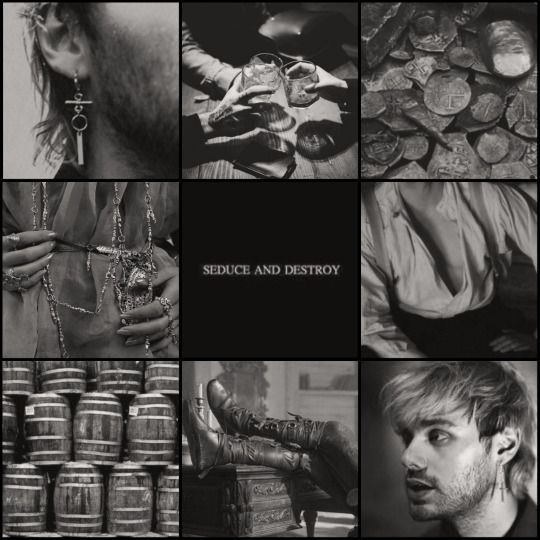
Pairing: Pirate!Michael Clifford & Reader
Word count: 3.3K
Rating: Just For Fun
Requested by: Not requested but it was supposed to be part of the Michael Week @sadistmichael hosted. I’m late as always but I’m still gonna post it 🤷♀️
Content: second person POV, gender neutral reader insert, best friends finding themselves in a night of chaos, drinking, swearing, violence but no graphic details, reader as a sex worker, brief appearances of Calum being A Little Shit
A/N: This all started because of that damn earring... I know that romance (in any form) does well on here, but I thought it would be fun to write a friend fic. Sue me. Big thank yous to @mashlums @haikucal @sexgodashton @jae-writes-fanfiction and @cheekysos for encouraging me on this one!
✨ Masterlist ✨
Let me know if you want to be added to or removed from my taglist 🌺
AO3 Link
Feedback is always appreciated! 😊
———
The wooden slats above Michael’s head groaned, heavy with footsteps and many years of wear on the high seas. It was clear that the ship was docking somewhere for the night to restock supplies, but Michael couldn’t be stirred from the hammock where he rested just below deck. Several minutes passed as he concentrated on the slow drip of water into the pail in the corner, looking for some sense of peace in the chaos the rest of the crew was creating. The metal made a sharp sound with each drop that hit, but it was a tone he’d grown accustomed to after many months aboard this particular ship. He often used it to lull himself to sleep, struggling to ignore Calum’s incessant snoring. It wasn’t until one of his crewmates shouted the name of a familiar port that Michael paid much attention to the commotion happening on the surface. Usually preferring to stay aboard the ship and not risk any potential scuffles on land, he now understood why so many of the crew were anxious to disembark.
Port Royal was notorious for the wide array of debauchery around every turn. Especially this time of night, it was always crawling with other scoundrels just looking for a bad fight or a good fuck. Or maybe a good fight and a bad fuck. The derelict port had such a reputation for its treatment of outsiders that none of the king’s men ever dared a visit, leaving the people who were floating through to act as their own law and order.
The grimy, dilapidated buildings just past the worn dock called to Michael. He’d lived a pirate’s life since he was orphaned as a young boy, sailing far and wide, but this port was the closest thing he had to a home. He only hoped that he could find his oldest friend still in the hut just past the wall where the land met the sea.
———
Michael made his way beyond the wobbly old dock, peering in the dimly lit pubs only briefly as he passed. His well-worn leather boots carried his tired feet through the filthy streets to an all-but-forgotten yet somehow still familiar scene. Covered by the shadow of the night couples of every sort were pressed against each other, no doubt trading secret desires. At his unfamiliar approaching figure, the silhouetted couples all vanished into the brothel before him quicker than he could blink an eye.
Hidden from easy view in the moonlight, the door slammed against the frame just as Michael approached. His hands, rough from years of work as a swabby, landed hard against the faded green wood thrice before it swung open. It rested uneven on its hinges and revealed a plump young woman in dark red corseted dress. The ruffles around her neckline were no longer a crisp, clean white but still managed to pull Michael’s attention directly to her ample bosom. His eyes continued to work over her figure. He didn’t miss the way her stomach pushed out against the ribbed garment covering it. She was such a sight that Michael considered a short detour before beginning to search the brothel for you.
“Well, ain’t ye a handsome devil. Fancy cracking Jenny’s teacup, eh?”
Before Michael could let a smooth response fall from his mouth, footsteps landing hard under long strides sounded down the hallway. Michael’s eyes, dark with lust, brightened as he took you in. You were exactly as he remembered and somehow completely different. It had been years since Michael was last in Port Royal but the two of you had kept up through letters as you were able.
“Back off, wench. This one’s wit’ me.” The woman in red threw a scowl and a few choice curses at you as you squeezed past her in the doorway, arms quickly finding Michael in a tight embrace. “Oi, s’that a hornpipe in yer pocket or are ya just happy t’ see me?” You offered him a cheeky grin as his face warmed, caught red-handed, and he cast his gaze past you to find the woman in red missing from the door frame.
———
As seemed natural, you and Michael found yourselves kicked back in the corner of the closest pub. Boot-clad feet resting high on the table and a second bottle of rum nearly gone, you shared laughs and stories between swigs that were drowned out in the raucous noise of the other patrons. Two large men were attempting to settle their score through a game of fisticuffs at the bar and neither seemed to have their wits about them, stumbling on their own feet. A number of recognizable faces from the brothel were here to pick up company for the night, or maybe just the next few minutes. The most familiar face among them was Ash. A wordsmith of sorts, he had settled in close to a pretty, young blonde with eyes so blue that you could make them out across the room. Michael could pick out the back of Calum’s head as he raked in a pile of coins, no doubt employing his sharp mind in a game of liar’s dice.
Unphased by the rowdy crowd, the two of you were content in a universe that was contained entirely at that corner table. Michael told you stories of all the places he’d visited since you’d last seen him. Tales of India and China and all the bounty you could imagine. To be no older than he was, he’d done a lifetime’s worth of travelling. It didn’t come easy though. Work aboard a pirate ship, even with a fair captain, was endless and often meant risking life or limb to secure loot. He also listened intently as you recounted your tale of the one who had left you high and dry after a broken engagement. It had left your heart with an unhealing wound as deep red as the rope burns on Michael’s calloused hands. His eyes remained soft as you spoke of the person you thought was finally going to pull you out of the life you led. Routinely selling your body to the highest bidder had never much bothered you. You often found a sense of power at being the agent of someone’s deepest desires.That was until this one particular person became a frequent caller of yours. You knew no shame about the way you earned your coin but now you were crushed under their broken promises of a steady life, a life that didn’t mean hiding from the law or rousing up drunk sailors just to put food in your stomach.
Neither of you would have chosen life as a criminal for yourselves, but any trace of life before this felt like it belonged to someone else. As Michael began to yell for another bottle of rum, the back door to the pub flew open and landed harshly against the wall behind it. The man standing where the door had been was intimidating.Twice as large as Michael and covered in tattoos. He was flanked by a woman whose arms looked strong enough to crush you with ease and a bald man with a weathered scar down the right side of his face, covered only briefly by the leather patch on his eye.
“I knew I smell’d a bilge rat. Clifford! We ‘ave a debt t’ settle!!” His accent was heavy and you thought maybe it was Irish. His eyes landed on Michael, lounging in the far corner. As Michael’s eyes went wide and he leapt to his feet, he felt his head spin from the booze. The man that had barged in drew his sword and that was enough to bring Michael back for just a moment, long enough to process that he was in trouble. He quickly pulled you to your feet and tugged you behind him. “Shame! We’re jus’ leavin’!”
It took most of your self-control not to spray out the last burning chug of alcohol you’d just thrown back before being snatched up from your seat. You made a quick recovery, considering the amount of rum you’d already swallowed down, crashing out the front door and spilling into the muddy road. You weren’t sure how long the two of you had been in the pub but you’d clearly missed any indication of the current downpour. You splashed through the streets, following Michael’s already soaked form in and out of countless doorways. As he cleared what had to be the twentieth doorframe, he stepped quickly into the corner and pulled you with him. You landed against his broad chest with a thud. It would have knocked the wind out of you if you hadn’t already been breathing heavy from the zig-zagged marathon.
As you took a step back from Michael, he let his fast grip fall and looked around at where he’d landed the two of you. He saw the pigs in the opposite corner sleeping in the cool mud and the horse’s stall just next to the pig pen. He held his index finger to his pursed lips, signaling you not to disturb the livestock. Just as you were finally able to catch your breath, you felt it hitch in your throat again as the large brutish man called out to Michael. “Alright ye filthy animal. I know yer hidin’ ‘round ‘ere somewhere.” You shared an amused glance at the choice of words. Michael began to slowly draw the large blade looped through the belt hanging against his hip, preparing to go down fighting. You felt a brief sense of panic at the realization that you’d left your own sword behind. Spying a smaller handle on Michael’s other hip, you reached your hand out to grip the tarnished handle and pulled it up in front of you. The knife flashed in the low light, smaller than the blade you were accustomed to, but desperate times....
Taking careful steps, or as careful as possible after two bottles of rum, Michael inched his way out of the barn door and into the rain. You were a few steps behind him and hadn’t cleared the door yet when the scar-faced man appeared behind Michael with a taunt. Just as he raised his blade to engage Michael, you brought the heavy handle of your weapon down on top of his head. The man immediately fell face-first into the water at Michael’s feet. Michael’s hair clung to his face in the rain as he spun to give you a wide-eyed but silent thank you, hoping the others that were still after him weren’t close enough to hear.
No sooner did the thought cross his mind than two menacing shadows appeared at the other end of the barn. You stashed Michael’s knife in your belt, bending down to snatch the sword from the man lying on the ground, and took off again hot on Michael’s heels. You followed him around the back of another house and down a pitch black alley.
As you emerged on the other side, a loud grunt sounded beside you, followed by the clang of Michael’s sword meeting the Irishman’s. It was shortly followed by his partner’s blade meeting your stolen one. Though you’d had your fair share of practice with a sword, you felt like a novice next to Michael’s skillful hand. Metal clashed as the storm raining down on the island intensified, lightning strikes flashing through the sky with every scrape of swords. The woman you were up against was clearly a better swordsman than you and you weren’t sure how long you’d be able to keep up. You weren’t sure how it had happened, but she had you backed against a wall. Your sword was the only thing keeping her blade from bearing down on your throat. As quickly as you could manage, you brought one hand to your belt, pulling the knife out again before landing it in the woman’s side. Her mouth fell open and she stumbled back from you as you removed the blade. Her sword clattered to the ground and it wasn’t long before she fell beside it. The wound wasn’t enough to kill her but it would keep her out of your way so you could help Michael.
You hadn’t been able to spare him a glance as you fought for your own life but you weren’t shocked to see that he was holding his own against the giant. You ran up behind the man with a yell and he spun around to meet your blow. After sending you stumbling back a few steps, he turned to face Michael again. He wore the shock on his face as Michael’s blade came to rest in the hollow of his throat. The man slowly lowered his weapon, realizing Michael had bested him. You heard a shuffle behind you as the woman reached for her sword. Your boot landed heavy on top of the metal as you trained your sword on her, daring her to make a move. Behind you, Michael’s words were lost in the sudden boom of thunder. Only when you heard him call your name did you take your eyes off the woman on the ground in front of you. Michael was backing away as he lowered his weapon, seeming to have settled his debt. You slowly removed your foot from the sword on the ground, giving the most menacing look you could manage, and ran after Michael’s retreating figure. When you caught up to him, you noticed that the sleeve of his open shirt had been torn and under it there was a gash in Michael’s bicep. After much persuasion, Michael agreed to follow you back to the brothel to get it cleaned up. If it became infected, it could cost him his life.
———
Bringing Michael in would have caught attention in any state, but as he held onto his arm and dripped rainwater everywhere, you gathered more stares than you would have liked. He leaned over the kitchen table, waiting for you to gather supplies. It wasn’t pretty but you doused the wound with alcohol and Michael seemed more upset at the loss of rum than the burning it caused. Once it was cleaned to your satisfaction, you ripped the hem of your clothing to tie it around his arm.
“Thanks.” His eyes were soft as they met yours. “I would ‘ave been a dead man without yer help.”
“Yer goddamn right! But what else are friends fer?”
You shared a laugh as Michael pushed himself back upright with his other arm, following you back to the front door and out into the night. The storm seemed to have run its course and left only a light drizzle in its wake as you made your way through the streets again, walking under cover of any roof you passed. You walked with your heads ducked between coverings as you laughed and recounted your astounding victory over Michael’s assailants, wondering what happened to the scar-faced man.
Up ahead, you spot a familiar figure walking in your direction. Without warning, you shove Michael into a dark alley and shush him with wide eyes. Luckily for you, your unfortunate recurring caller had kept their gaze on the ground in an effort to keep the still-falling droplets off their face. They hadn’t seen you disappear but you hadn’t noticed how incredibly narrow this alley was. You shivered as you felt Michael’s warm breath fall across your rain-slicked face. Your feet stood between his and there was hardly enough room between your chests to take a full breath in. Michael’s eyes stayed trained on you, looking for any sign of an all clear. You watched intently, waiting for the caller to pass by. Once they made their way by the narrow opening where you hid without suspicion, you placed your hands on Michael’s sides to steady yourself and pushed your head toward the street. As the figure made a turn, you counted to three silently and stepped out into the street again with a dramatic exhale. Michael slowly followed you with a quizzical look on his face.
“Ya can wipe that look off yer face, ya smug bastard. I ain’t talkin’ ‘til ye explain the burly man and his goons chasin’ ya earlier.” Michael’s expression dropped with a humorous scoff, unwilling to share what had landed him in such trouble. Nights like tonight were exactly why he preferred to stay aboard the ship. He just couldn’t resist the chance to catch up with you. You also knew that tonight would cost you. Literally. You’d have to up the ante the rest of the week to make up for the night out but you felt that Michael was worth it.
———
Conversation continued to flow easily, as if nothing between the two of you ever changed. You weaved through the streets, careful to avoid main thoroughfares for worry of any more excitement. Two close calls was enough for one night. It didn’t slip your notice that both of you took to yawning big, deep breaths much more frequently as the last few hours slipped by, a sign that the morning light was well on its way. You knew you’d be able to catch a few hours of sleep once Michael was back on the water, but you also hoped he’d be able sweet-talk someone into letting him curl up in his hammock for a little while. You didn’t give it too much worry though. You knew Michael never had trouble sweet-talking his way through anyone. He’d always been a charmer.
As you made your way through the last side street and onto the dock, you heard a loud rumble of footsteps and immediately braced your newly-found sword. Your other hand fell on Michael’s knife, still tucked into your belt, and quickly handed it over to him as he drew his own blade. A flash of surprise crossed his face as if he’d gone all night without realizing the knife was missing. The sounds of enraged men grew louder as they rounded the corner. Michael immediately recognized Calum at the front of the crowd, realizing quickly that Calum’s clever antics had landed him in trouble yet again. You followed Michael’s lead and dropped your weapon as he let out a full-bellied laugh. As Calum dashed past you down the dock, he yelled out a casual greeting and flashed a cheeky grin. “Michael!” One hand raised to meet his brow in a salute. “Michael’s friend!” Another salute.
You joined Michael in another fit of laughter. As he turned to watch Calum running down the dock to their safe haven, Michael saw their ship and realized the ropes were being pulled off the dock as the ramp to the ship was being dragged back over the railing. A few curses fell from his lips as he took off in a dead run after his friend, yelling something unintelligible over his shoulder that was surely meant for you. You thought it was something about not groping for trout in any peculiar rivers but had no idea what he could mean and dismissed it as Michael being Michael. Your sides began to hurt from laughter as he passed the angry mob to catch up with Calum. Both men leapt through the air at the same time as their ship pulled away from the dock. Calum’s hands grabbed hold of the railing while Michael employed his knife to keep hold of the ship. Calum pulled himself overboard with ease and turned to quickly bring Michael onboard with him. A few brave, but ill-fated, members of the mob risked a jump but landed in the water with a splash. They resurfaced with enough curses to make Blackbeard blush. Michael threw an obscene gesture at the disgruntled men before lifting his gaze to wave goodbye to you as they made off into the bright sunrise under a clear sky.
———
taglist: @easierlftv @haikucal @mashlums @youngblood199456 @calumbroutledge @atlcalm @another-lonely-heart @castaway-cashton @itsjen223 @bloodyoathcal @vapor5sos @myloverboyash @justhereforcalum
#michael2020#michael fluff#michael clifford fluff#michael x reader#michael clifford x reader#michael one shot#michael clifford one shot#my writing#mine
67 notes
·
View notes
Text
Aziraphale and Crowley decide to go travelling.
They have been on Earth for over six thousand years, but they’ve not actually seen that much of it. They’ve been soldiers posted at a garrison, responsible for the blessings and/or temptations despatched in the British Isles for jolly well most of that time, and they can’t just faff off whenever they please. (As well as, of course, the unspoken fact that neither of them will stray too far from the other. Aziraphale’s had to handle the Irish-related bits since the fifth century, when a killjoy bloke named Patrick chucked the snakes out. Pity, that – Crowley, being red-haired and fond of drink and trouble, would love to come back, but alas.) They have moved out of London and to that cottage in the South Downs, itself a change after living in the city for almost five hundred years, but it doesn’t take long for them to realise that without constant marching orders to await and no destruction of the world to avert, they’ve got… time. And one morning Crowley suggests, and Aziraphale somehow finds himself agreeing, that they just bugger off and see the lot of it. Or at least make a start.
They don’t travel like humans who want the big flashy commercial bits: the Eiffel Tower, the Great Wall of China, the Sydney Opera House, Disneyworld. Aziraphale thinks at first that they’ll just ride in Pullman cars, something he has always rather wanted to do, and is dismayed to learn that Pullman cars went the way of the dodo in 1968. Failing that, they should just fly, or miracle themselves. He’s taken aback when Crowley thinks it’s funny to insist on human transport, though Crowley himself was responsible for many of the recent innovations of the airline industry and has to admit, the first time they’re stuck in economy class aboard an over-booked jetliner with a screaming child behind them, he may have overdone it. They are subject to delayed trains, packed buses, leaky ferries, and the delights of something called a moto, which Aziraphale might have enjoyed more if he wasn’t screaming the whole time. Course, Crowley loves it. Nothing but respect to any mad bastard brave enough to drive that fast in Rio de Janeiro.
(‘Oh,’ Aziraphale says softly, as they stand at the very top of the hill, beneath the vast shadow of Christ the Redeemer, and think back to that promising fellow they saw nailed to the branch in Golgotha, and gaze down, down, down at the green mountains and the glittering city and the sun-blazing sea. ‘Oh, my.’)
They argue about where to go next. Crowley thinks Russia is too cold and Aziraphale thinks India is too hot, but they end up in both anyway. Aziraphale is entranced by a night at the Bolshoi Ballet in Moscow, and they wake one morning in the thick air of a humble guesthouse along the Ganges, smelling the burned offerings of the temple and listening to the splash of bathers and the chittering of the monkeys that stole their curry. They are generally pegged for gormless Englishmen wherever they go, or at least Aziraphale is; something about him just screams bum bag and floral-print shirt. Crowley manages to deter any local trouble by being himself, or if need be, flashing a strategic glimpse of his eyes. Not that that always works. A bunch of clubbers in a neon disco in Rome think it’s very chic.
(Crowley doesn’t like Rome much. He can barely walk round the city without looking like a jitterbug, and Aziraphale refuses to let him pop in on the Pope one morning in his skivvies, give the old man a good jolt. Supposedly it’s romantic, and watching a sunset over the Colosseum, hand in hand, Crowley can admit it’s got that going for it, memories of the lions that used to be big here notwithstanding. Nonetheless, he is relieved to leave.)
‘Look at me,’ Aziraphale beams, having ordered them a scrummy spread in Greece a few days later. ‘Real gentleman of the world, don’t you think, my dear? Pity we can’t see the Parthenon from here, but I suppose I can always – ’
‘If you say so, angel.’ Crowley lights a cigarette and tempts the loudmouth bastard blocking the view to go home and rethink his life. ‘Take another look now.’
They go to New York so Aziraphale can see a Broadway show, whereupon Crowley wonders how America has got into such a mess even with nothing whatsoever to do with him. Wants no part of that, thanks. They pop up to Canada after, which turns out to mostly be more Canada, though Crowley nearly hits a moose driving at ninety miles an hour down an empty highway and that would have good and discorporated both of them. They wind up at a tiny roadside motel where the only sound are the crickets and the distant sigh of passing cars, where it is deep summer and green and slow, and they lie on the bed with Aziraphale’s head on Crowley’s chest and neither of them say a word.
They drive down to San Francisco and fly from there to Tokyo, which delights Aziraphale with its proximity to sushi, clean and precise public transport, and miles of convenience stores to supply every imaginable item. Everyone looks somewhat surprised when he speaks Japanese. Crowley is just tall enough to regard doorways with suspicion, and cannot slack his vigilance when going through them. One such mishap leaves him with something of a lump when they arrive in Istanbul. Aziraphale’s wallet gets pinched in the Grand Bazaar, then after a brief and exciting episode involving a snake head, hastily returned. ‘Mesopotamia,’ Crowley remarks breezily. ‘Always an adventure in these parts, isn’t it, angel?’
They make their way down into Africa, where Crowley insists on paying homage at Freddie Mercury’s hometown in Zanzibar. Aziraphale snaps a photo of him at the sacred site and supposes that will be going into pride of place in a frame back at the cottage. They’re both burnt brown and riotously freckly, at least in Crowley’s case, and Aziraphale has acquired, under his dearest’s expert tutelage, a succession of fashionable sunglasses. They walk along a deserted beach in Cape Verde and sleep curled together in a hammock with waves lapping soft on the sand. Get on a boat headed to some island in the middle of the Atlantic, out in the arse-end of absolutely bloody nowhere, and gaze up at more stars than either of them, a pair of celestial beings, have ever seen in their lives. These do not fall, or burn, or break. The heavens do not brim with fire, nor does hell rise up. The world is at a point of perfect stillness.
‘We should get married,’ Aziraphale says one night, as casually as if it’s something that has only just occurred to him. ‘I mean… for the tax purposes.’
Crowley turns to stare at him as if it is the stupidest thing he’s ever heard. ‘Tax purposes?’
‘I just…’ Aziraphale opens and shuts his mouth. He still owns the bookshop, since he couldn’t bear to part from it, though he’s hired a couple of bright young things to run it. But of course, tax purposes do not actually have a rum thing to do with any of his reasons for asking. ‘If you didn’t… didn’t want...’
Crowley kisses him, hard and sharp and hungry. They don’t say more about it then.
They narrowly escape a hurricane in the Caribbean. They go on a trek through the Andes of South America, whereupon Aziraphale does not enjoy himself at all and has to shout at Crowley to stop leaping up hills like a lizard. They go up to Norway and putter along the fjords, and Crowley gets very drunk and pretends to be Thor. (His hair is growing out again, and he could throw lightning and thunder if he wanted to.) They hop to various cities in Europe on weekend discount-airline deals and go to the Christmas market in the Old Town Square of Prague. The really delightful thing about all this travelling, they discover, is the ability to come home together. Pop along on the train from Luton or Stansted or Gatwick or Heathrow, crunch up the walk with their bags, unlock the door and collect the post on the mat and go into the kitchen, make a nip of supper and crawl into bed together, half-packed suitcases dropped on the floor. It’s a lovely cottage. The houseplants are verdant and properly terrified, and the books cover every flat surface.
‘We should get married,’ Crowley says, on a flowering spring night in Vienna. ‘Horribly antiquated human institution and all that, but…’ He trails off, then shrugs elegantly. ‘Tax purposes.’
‘I thought, my dear,’ Aziraphale says, taking a sip of his wine, ‘that was originally my suggestion.’
Crowley’s yellow eyes sparkle at him. In this light, they are almost gold, rich and depthless, and Aziraphale would be very happy indeed to spend the rest of forever drowning in them. Placidly the demon says, even as his fingers interlock with his angel’s under the table and hold on tight, ‘I have no idea what you’re talking about.’
#good omens#good omens ff#good omens fanfiction#ineffable husbands#crowley x aziraphale#queue#this brought to you whilst i am travelling home myself#i have feelings about this k
3K notes
·
View notes
Text
One word for you...

Where I have not gone plastic-free:
Bread box: There are no plastic-free, airtight bread boxes that I’ve been able to find and I *must have* airtight. I make my own bread in a bread machine just because I like to, and the first few loaves I made here on the humid island grew mold within three days because my old bread box was not airtight. Bread bags are more eco-friendly but aren’t airtight, and will hold the humidity. I could find no silicon boxes and also could not find silicone containers/bags that I could be sure would be big enough to hold a loaf of bread and still close completely. I’m considering a giant silicone bag I found online, for marinating meat, so if I get that I can see if a loaf will fit inside. But I haven’t pulled the trigger on that yet, buying something just to marinate meat doesn’t fall neatly into the “I really need it now” category. So I purchased a BPA-free plastic, airtight box and it seems to be working very well. It’s so airtight that I was able to store bananas in it as well and there has been no sign of fruit flies.
Suncare: I spent two days working on the porch. I was under a roof in shade the entire time but I sunburn if I stand next to a toaster, so at the end of the second day I looked like Roy Neary in “Close Encounters of the Third Kind”. As in the right half of my face was bright red. I wasn’t wearing sunscreen because it breaks me out. All of it. Every single sunscreen ever. They all break out my face, neck and chest within 20 minutes of application. So I did some research and learned about mineral sunscreens versus chemical sunscreens and after reading a lot of recommendations and reviews, I ordered Alba Botanica Sensitive Mineral Sunscreen. Yes the tube is plastic, but there’s probably no avoiding that. The sport cream is 45 SPF, waterproof for up to 80 minutes, vegan, free of all the chemicals that turn my face into a Marscape, biodegradable and - get this - reef safe. That’s a “gee how nice” for most people but now that I’m swimming around coral reefs, shit got real. They also make a spray-on but it’s not legal to ship aerosol cans to Hawaii, something about them exploding under pressure blah-bibby-blah. Pretty bummed about that. For those wondering, until now I’ve worn a sun visor whenever I’m outdoors but it didn’t occur to me to wear it on a covered porch. I’m sure it didn’t occur to Roy on a dark deserted highway in the middle of an Indiana night, either. LATER UPDATE: Native makes a mineral sunscreen and I thought it wasn't water resistant, but it turns out that it is, although I should not have had to dig so deep into their website to find this out. Better than getting anal probed, all things considered. The Alba sunscreen is very thick and hard to squeeze out of the tube, and you can feel it on your skin at first but you forget pretty quickly. It is completely unscented. You have to make sure to rub it in well if you don’t want to look a little weird. It showers off clean and easy and after a few days with it, not a single blemish! Our pharmacy sells some water resistant mineral sunscreens. I didn’t price them the last time I was there to compare with online ordering and they are probably reef-safe because as of January 1 of this year, suncreeens containing oxybenzone and octinoxate are banned in Hawaii to protect the reefs. But my next purchase will be Little Hands because it is made right here in Hawaii. I have been a big believer in ‘buy local’ for many years and they are plastic-free.
Groceries: Groceries haven’t changed. I’ve been using cloth shopping and produce bags for many years, they just bloody well work better. I do buy some foods in plastic, often there just isn’t any alternative. This was true even on the mainland. The main change is that now I walk to the store more often than not. I was able to walk to almost everything I needed when I lived in Austin’s SoCo in the early aughts and I loved it, I am so so happy to be able to do that again. Knowing I’m just a pleasant stroll away also means that I only buy what I need in the immediate future. There are a few exceptions for items that sell out very soon after the weekly supply barge comes, and don’t always get restocked even then. I drive when I have to buy heavy or awkward to carry things, like a case of soda. I’ve found conflicts with grocery choices because of a weird contradiction: non-hippie products in cardboard/paper packaging versus hippie products in plastic. I first noticed this when I went to buy sugar the other day - do I get the organic non bleached sugar in the plastic bag, or the nonorganic bleached sugar in the plastic bag? It wasn’t much of a conflict in any real world sense, just something that grabbed my attention. (I went with the plastic by the way, for the organic foodstuff that was going to go into my body).
Probably the clothesline, I have no idea what the hell that thing is made of, most likely nylon. We don’t use it for everything because it’s too humid here to dry everything in a reasonable amount of time. But we use it for some things - especially towels and swim wear - and I’m glad that we have it and it saves money on electricity. Our electricity generation here on the island is likely solar but still, no need to be greedy about it. Lots of people here have clotheslines, they are a common sight I am glad to see.
Bandages: I use Wellys. Patch bamboo bandages sound great, but I am clumsy AF and so I need bandages that are going to stay on through wet and dry and everything else. Wellys are flexible fabric, latex-free bandages made in the USA, in reusable tins that you can buy refills for if you don’t want a new tin, and that create a seal around all four edges. They are a certified B Corp so even with a bit of plastic, the company is still in line with my ethics.
Makeup: I use mostly mineral makeup, because it lasts longer (no organic ingredients to breed bacteria) and many mineral brands offer smaller quantities that are more sensible for people who don’t wear it everyday, or at least don’t wear the same colors every day. On the mainland I went weeks without wearing makeup and here I’ll probably go for months, it’s just such a casual place. I might wear some when we go across to Maui for a long weekend. But there are a lot of all natural and plastic-free makeup options out there these days, I am glad to see. If I need to replace anything I will shop with them but it’s just stupid and wasteful to toss everything out and buy new. One thing I won’t compromise on is mascara, I use Thrive because it really does what it claims, and it is still a company that aligns with my ethics. Many zero-waste brands sell cake mascara and that’s a complete nope for me. I tried cake mascara in high school, when I was going through my Audrey Hepburn/Sophia Loren makeup phase and I really didn’t like it. I also tried cake eyeliner and must confess that this elder goth never ever got the hang of liquid eyeliner, Icarus winged better than I can. I gave up a long time ago, pencil me in baby. Also, I wear lipstick, the paint-on stuff that stays on through food, drink, sex and a nuclear blast. IMO, lip balms are a waste of money and do not count as ‘makeup’, unless you’re only intention is to prevent chapped lips and with a small amount of color that lasts few minutes at a time.
Hair brush: I need a new hair brush that is designed for my long fine mane because my hair is getting a lot of punishment here, between wind and swimming and so more frequent washing and lots of pulling and tugging into braids. I bounced back and forth between Ibiza (boar bristles, wood handle) and Mason Pearson (boar bristles, plastic handle), for about half an hour. I finally decided to bite the big one and invest in the Mason Pearson. It is universally reputed as the best hair brush to be had on planet Earth. The was company founded in London by a Yorkshireman named Mason Pearson (bet you didn’t see that coming) in 1885. The boar bristles are either shed bristles collected from the wild in India and China or sourced from the meat industry as they are a by-product of processing farmed boar; you may ask so I will answer and yes, I do eat boar. Mason Pearson is still owned and run by the Pearson family and the Pearson women have always played integral roles in the company. Indeed Mary Pearson was the CEO for the 20 years following the death of her husband, founder Mason, and one of their daughters ran the top floor of the factory on Old Ford Road in London for 50 years. You can purchase a brush with a handcrafted made-to-order wood handle but while I am willing to make the investment in a Mason Pearson brush, I just can’t bring myself to be so self-indulgent as to even send a price inquiry for the wood model. This is where my best friend reminds me of the lengths I went to and the price I paid to obtain a bottle of the finest Irish whiskey in the world to demonstrate that yes, I can be that self-indulgent without much convincing. I just can’t bring myself to do it with a hair brush. I purchased from Pasteur Pharmacy in NYC because they made their bones, if you will, in their early years in the 60s by catering to humans with dogs.
Bed blanket: I just couldn’t bring myself to buy a bamboo blanket/bedspread that costs in the $275 neighborhood when the dogs will be spending at least as much time on it as we will spend under it. So we went with half cotton/half bamboo for a much more reasonable price. The temps here are warm by the thermometer but the air is heavy with humidity (100% yesterday and that doesn’t necessarily mean rain), so when the fans blow it around it can be pretty damn chilly. And the dogs steal the covers.
Clothing: if I need new clothing I will consider bamboo but it’s damned expensive. I was shopping for a second bathing suit recently because I’m at the beach often enough that I need a suit to wear while the other one is drying or waiting to be laundered free of all the salt and sand that didn’t wind up in my ass or under my tits. I always thought that sand-in-uncomfortable-places was a joke, I was very wrong. I spent two hours searching for bamboo or other plant-based sustainable fabric or recycled fabric and found nothing under a hundred bucks. Nothing. Not even a thong bikini (I already have sand up my ass, I don’t need material there as well). I’m not lounging instagrammatically on Waikiki, I’m swimming in 5+ foot surf every weekend at least, so I am not willing to pay that much for a suit intended for plenty of use and punishment. I got a bikini because it will be easier to discreetly rinse most of the sand away before going back up the beach, if you know what I mean and I think you do.
5 notes
·
View notes
Text
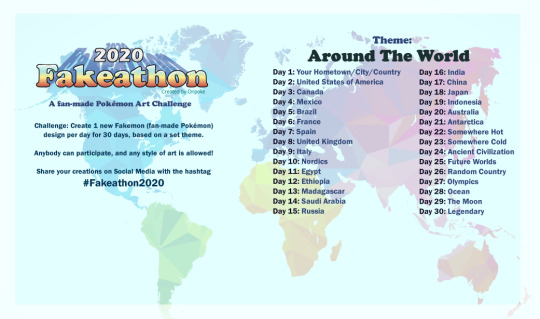
ALL THIRTY OF MY ENTRIES FOR FAKEATHON 2020 COMPILED BELOW THE CUT
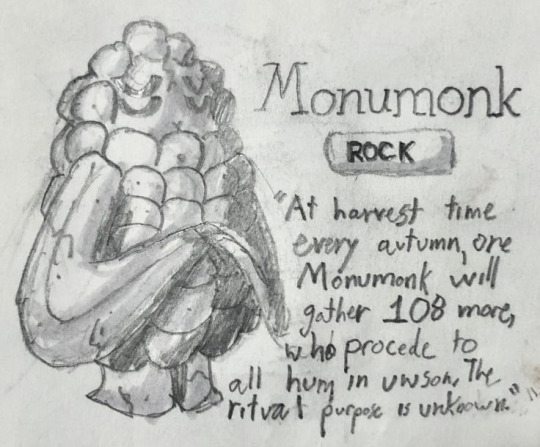
ROUND 1: HOMETOWN MONUMONK - Derived from monument, monk
did you know I like maybe four miles away from a field of 109 identical 7 foot corn statues

FAKEATHON ROUND 2: THE USA ROBINOX - Derived from robin, autumnal equinox
Round one was our hometown, and I did my current city. But my childhood belongs to Connecticut, so I wanted to do a connecticuter. The american robin is the state bird of Connecticut, and as a part of New England it has a colonial history, hence the style. A type of garnet is the state gemstone, hence the species name.
Mostly though, I associate Connecticut with the vibrant autumns. The falls of New England are magic.
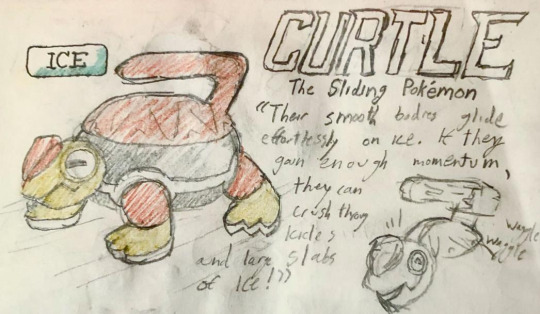
FAKEATHON DAY 3: CANADA CURTLE - Derived from curling, turtle
Very simple this one. Canada has a lot of curling events, right? Put the CURLING STONE. On the TURTLE. and you get the CURTLE. Dudes in this other server I’m in really love this one
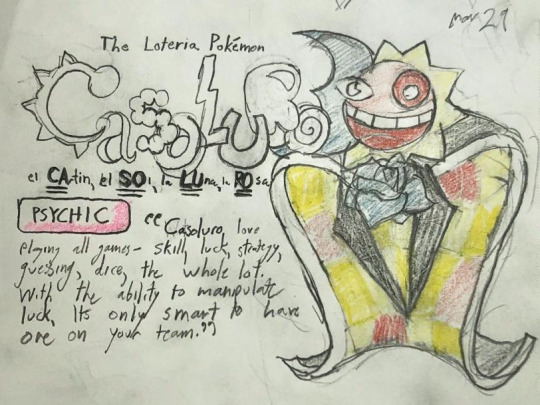
FAKEATHON DAY 4: MEXICO CASOLURO - Derived from first two letters of the cards it’s based on; el CAtrin, el SOl, la LUna, la ROsa
A very fun one to work on. These are based on those Loteria cards - Specifically, the sun, moon, rose, and the dandy. The 4x4 grid on the inside of its cape is a reference to the 4x4 grid of a loteria play mat. Just threw crap at the wall here and got this funky friend.
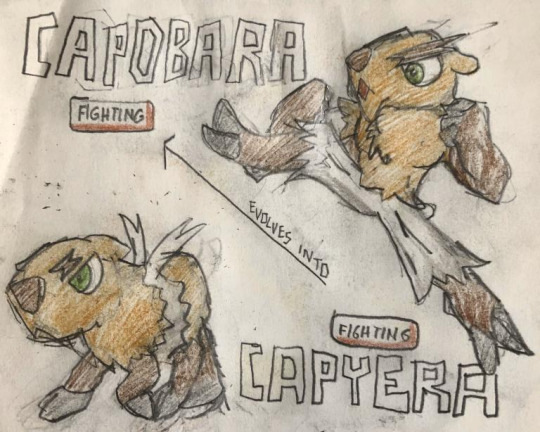
FAKEATHON DAY 5: BRAZIL CAPYERA, CAPOBARA - Derived from capoeira, capybara
Not new designs, so much as designs I really needed to give another go. Much happier with these. And frankly, couldn’t think of a concept more wholly Brazilian short of slapping the flag on them.
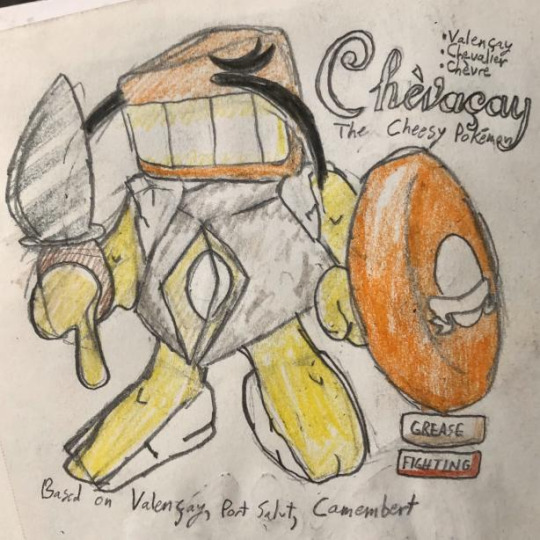
FAKEATHON DAY 6: FRANCE CHÈVAÇAY - Derived from chèvre (French for goat), Chevalier (French for knight), valençay (French variety of cheese)
F🥐R🎨A🍷N🚬C🥖H
I stole the grease type from someone in that fakemon server it fit this cheesy boy too well
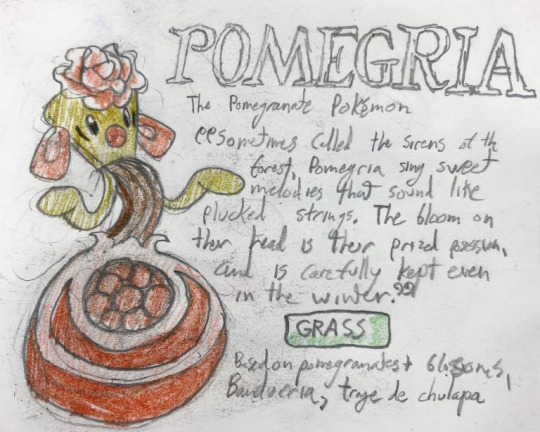
FAKEATHON DAY 7: SPAIN POMEGRIA - Derived from pomegranate, bandurria
Typically tried to avoid the lady-in-dress motif, but felt too justified here. Spain is home to pomegranates, with the blossom being the national flower. The body shape was inspired by the instrument the bandurria, with the base of the body being a halved pomegranate, and her “earrings” being both the tuning pegs and pomegranate seeds.
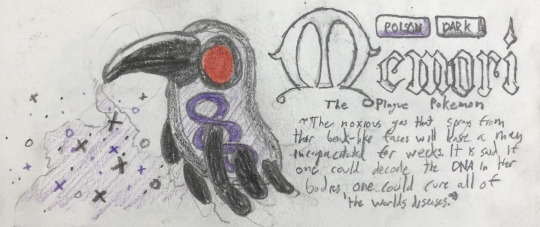
FAKEATHON DAY 8: UNITED KINGDOM MEMORI - Derived from memento mori, memory
I could’ve uh. Had this idea at a better time huh :^)
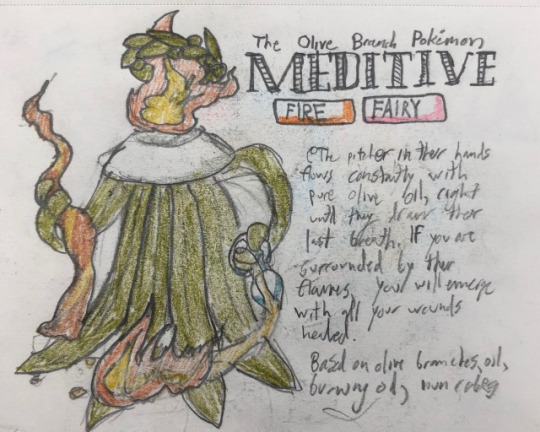
FAKEATHON DAY 9: ITALY MEDITIVE - Derived from Mediterranean, olive
Tried going more off-the-wall, but it didn’t quite work. Based on olive branches clearly - olive oil was often used as lamp oil, hence the fire typing. I meant for it to resemble a nuns habit or monastery robes, a la Italy’s heavy catholicism, with the floating olive leaf circlet as a halo. It was… good ideas that didn’t come together perfectly. Probably my least favorite of the lot
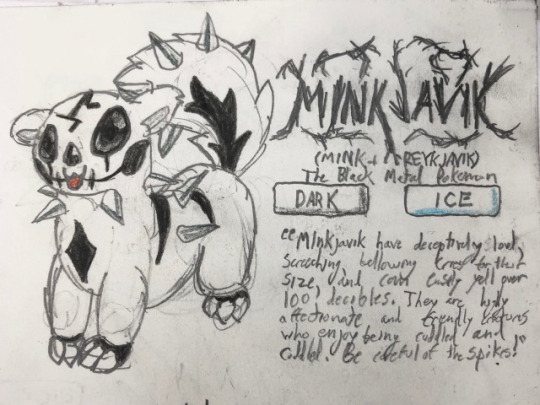
FAKEATHON DAY 10: NORDICS MINKJAVIC - Derived from mink, Reykjavik
Look when I think Iceland I always think black metal. This is the second time I’ve done a heavy metal pokemon. The first one was more badass. This one’s instead uh A lot : )
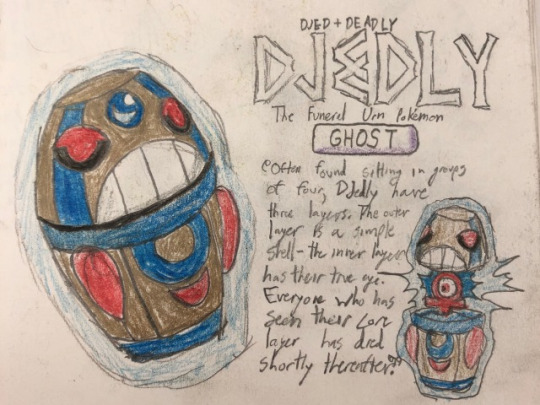
FAKEATHON DAY 11: EGYPT DJEDLY - Derived from Djed, deadly
One of the easiest to draw for… obvious reasons. Based on a canopic jar, sort of like an off-brand yamask or cofagrigus. It’s meant to open up twice; If you take off the lid, you see the fleshy eyeball dude in the lower corner. And if you pull that like a handle, you see what’s inside… and die with that knowledge : )
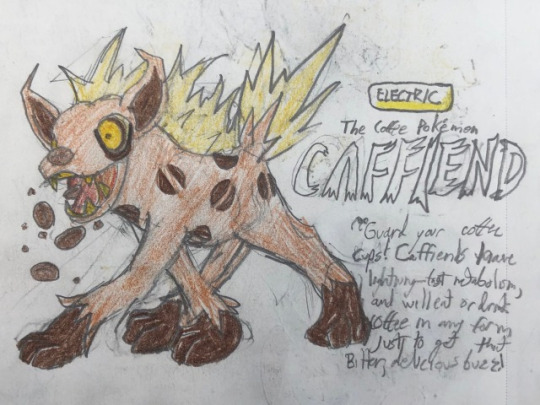
FAKEATHON DAY 12: ETHIOPIA CAFFIEND - Derived from caffeine, fiend
Obviously hyenas live in Ethiopa. But moreover, Ethiopia is also known as pretty much the birthplace of coffee, and coffee drinking/making is important to the culture. So I thought, why not make a hyena that’s super happy cause it’s always super hyped up on caffeine? Dunno if the electric typing makes much sense, I just thought caffeine = energy = electricity
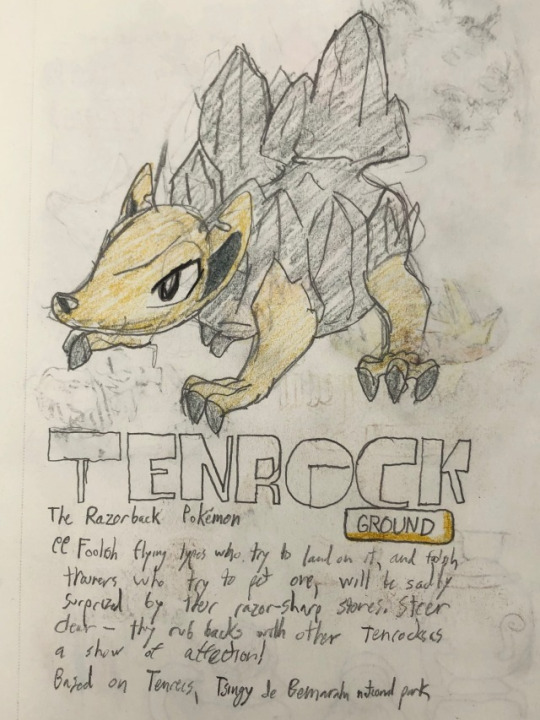
FAKEATHON DAY 13: MADAGASCAR TENROCK - Derived from tenrec, rock
Tenrecs are endemic, yeah, but this wasn’t just based on a native animal. It was based on the land of Madagascar - specifically, the gorgeous and incredibly sharp structures of Tsingy de Bemaraha National Park. I’ll post a photo above the art, when I saw Madagascar was a theme day I knew I had to base something on that park.
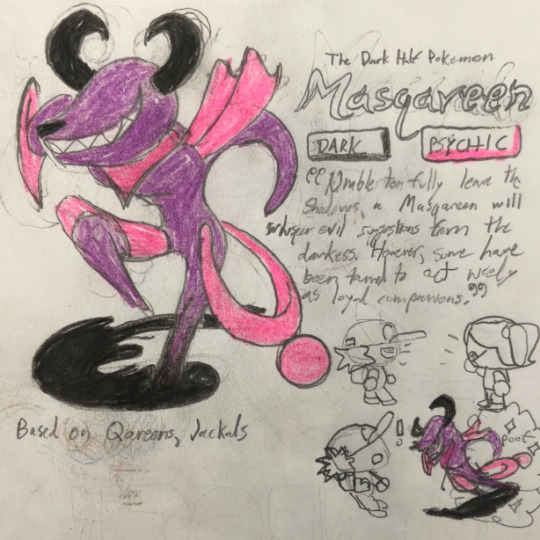
FAKEATHON DAY 14: SAUDI ARABIA MASQAREEN - Derived from masquerade, Qareen
This is based on the Islamic idea of the Qareen. People don’t 100% agree on what Qareens are, but they are consistantly considered to be spiritual doubles - Every person has a Qareen associated with they’re spirit. This is based on one idea, them as dark spirits who attempt to lead their companion-spirit astray. I chose them because even though they’re evil from the start - hence the dark typing - they can become good based on their companion - in this case, trainer’s - actions and whims.
Since they’re counterparts to humans, I thought having them mimic humans would be fitting. It’s body is ALMOST humanoid, it’s many pink extremeties ALMOST resemble clothes. It would be a zoroark like situation, where it could make illusions to resemble human.
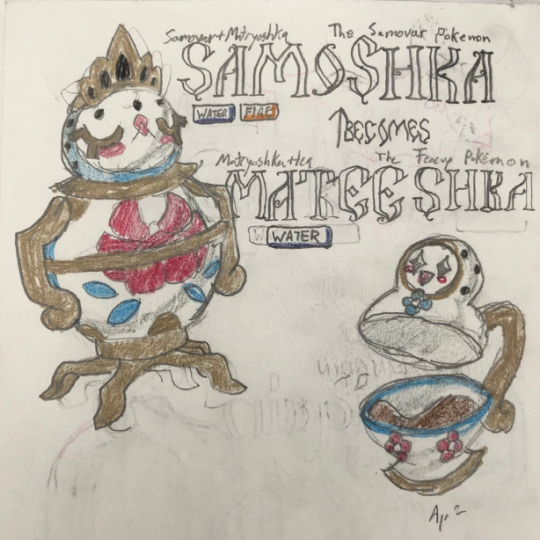
FAKEATHON DAY 15: RUSSIA MATEESHKA - Derived from mastryoshka, tea SAMOSHKA - Derived from samovar, matryoshka
Fun fact, I actually used to collect matryoshka dolls. Have a whole box of them in the basement somewhere. So I felt I had to. I have a thing for designs that look a little snobby, Samoshka certainly fits that little niche of mine : D
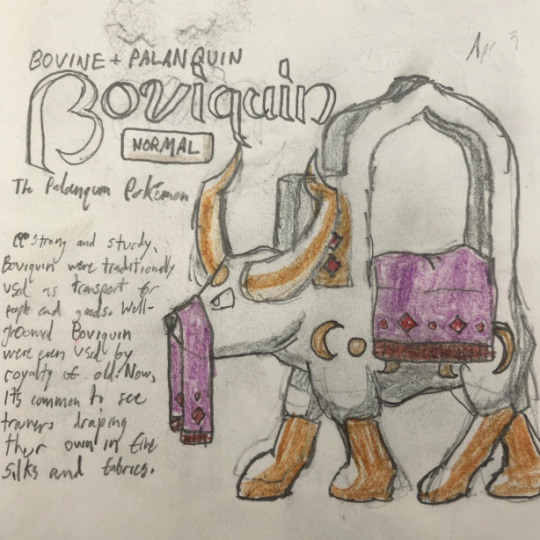
FAKEATHON DAY 16: INDIA BOVIQUIN - Derived from bovine, palanquin
I like ride pokemon, and I like customizable pokemon. So I made one that’s both! It’s supposed to be based on the water buffalo. The simple colors are because it’s supposed to be customizable - As in, the fabrics hung from it (and maybe the markings painted on it) could be swapped out, so I wanted something simple as a base. Sort of like Furfrou, but the customization doesn’t wear off
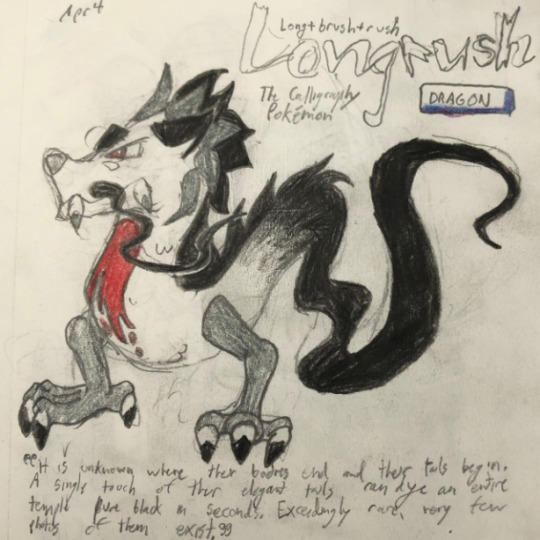
FAKEATHON DAY 17: CHINA LONGRUSH - Derived from Long (chinese for dragon), brush, rush
I expect here will be a lot of chinese dragons this round, I wanted to avoid the obvious. But… this is one of the best concepts I’ve ever come up with. The second I had the mental image, I knew that was it
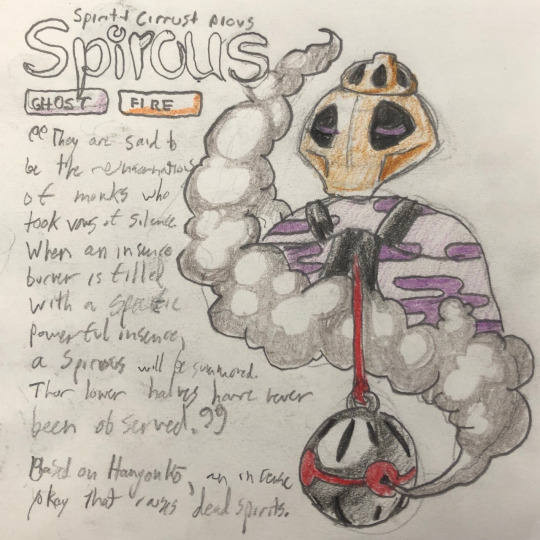
FAKEATHON DAY 18: JAPAN SPIROUS - Derived from spirit, cirrus, pious
This is a myth from both China and Japan, but I associate it with yokai primarily. This is based on Hangonkō, incense that brings forth the spirits of the dead. Hence it’s body obscured by the clouds - It’s literally being summoned by the incense it carries. In retrospect, this could have been an interesting pokeball mimic with different colors.
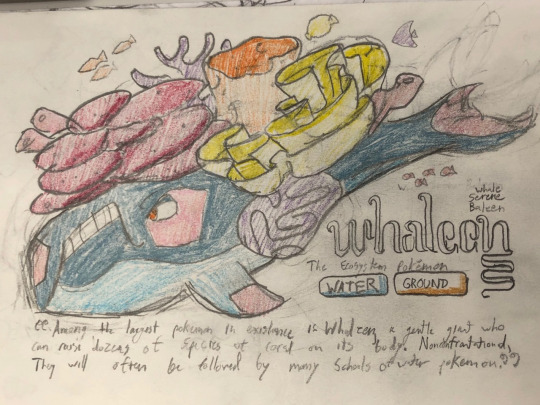
FAKEATHON DAY 19: INDONESIA WHALEEN - Derived from baleen whale
The Philippines are home to the coral triangle, a stretch of ocean that’s home to a stupidly large amount of coral life. So I initially wanted a coral mon… but it’s known for its reefs. So why not make the whole reef?
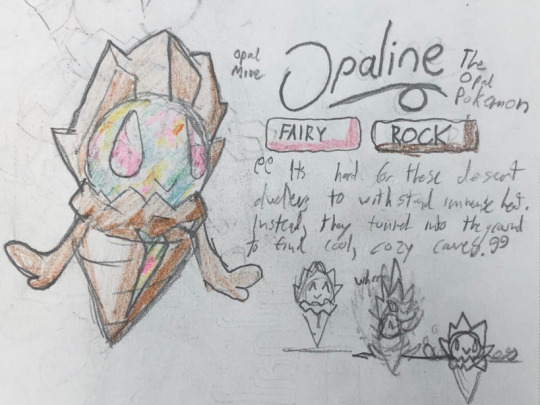
FAKEATHON DAY 20: AUSTRALIA OPALINE - Derived from opal, mine
One town in Australia I’ve loved since middle school is Coober Pedy. Known as the opal capital of the world, it’s a desert town that’s so hot, almost all the residents live in houses carved into the ground. Even many businesses and hotels are underground! Coloring was fun on this dude :3
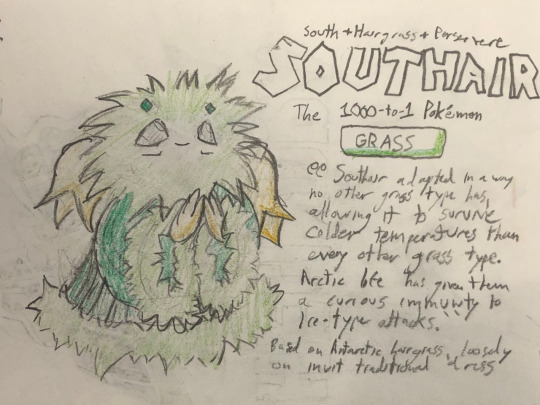
FAKEATHON DAY 21: ANTARCTICA SOUTHAIR - derived from south, hairgrass.
I wanted to do something unexpected. So rather than do that obvious penguin or similar, I went with southern hairgrass, the south most flowering plant. Did it’s closer meant to loosely resemble any wet clothes, but since there are no Inuit populations to Antarctica, only loosely. It’s species, the 1000-to-1 pokemon, Refers to both its chances of survival and the fact of the body is comprised of many many blades of grass
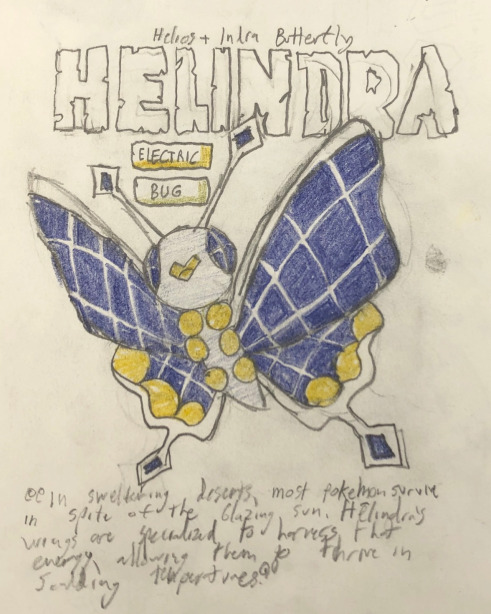
FAKEATHON DAY 22: SOMEWHERE HOT - DEATH VALLEY HELINDRA - Derived from helios, indra
The reason I chose the Indra butterfly is because it's native to death valley. I figure, if death valley gets HELLA sun, why not instead of it living in spite of the harsh sun, living so well because of it?
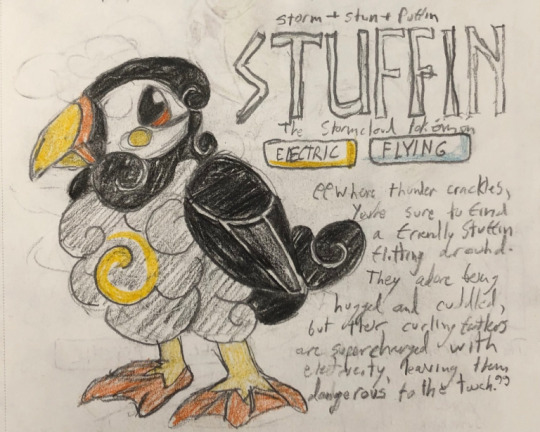
FAKEATHON DAY 23: SOMEWHERE COLD - GREENLAND STUFFIN - Derived from storm, stun, puffin
I know there are myths that say puffins can bring thunderstorms, so I thought why not turn a puffin into a storm cloud? But uh. It kind of just. Is a puffin isn't it :/
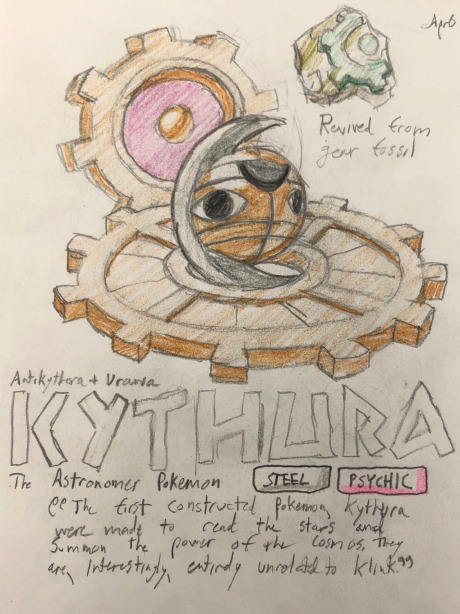
FAKEATHON DAY 24: ANCIENT CIVILIZATIONS KYTHURA - Derived from Antikythera, Urania
One of my favorite remnants of ancient times is the Antikythera Mechanism. It was an ancient Greek computer. With proper gears and mechanics and everything, that was used to plot the locations of the planets and the stars in stunning detail. This first go around turned out… not that great, I’ll be honest. But I wanna do something with the Antikythera Mechanism. It shouldn’t take TOO much tweaking to make this something I love
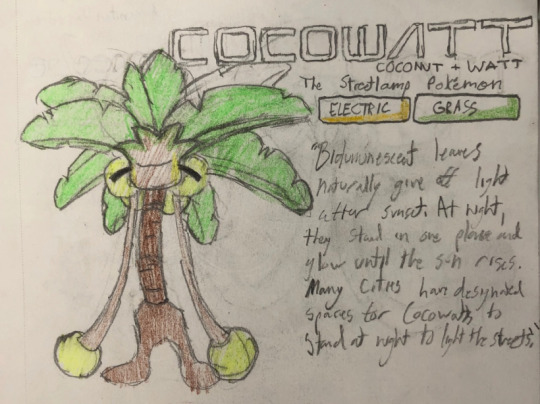
FAKEATHON DAY 25: FUTURE WORLDS COCOWATT - Derived from coconut, watt
One of my favorite images of the future is, instead of all streets having street lights, some having bioluminescent trees! I wanted to make something to that effect. Even though we have Exeggutor I chose palm trees cause they already have a street-lamp-like shape. Finally got to bust out my super neon pencils :3
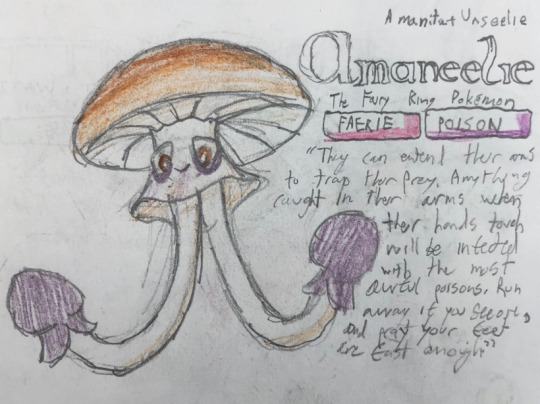
FAKEATHON DAY 26: RANDOM COUNTRY - IRELAND AMANEELIE - Derived from amanita, unseelie
I have irish blood, so I wanted to do an irish mon. I took the idea of the fairie ring in a weird direction - when it extends its arms and the little purple "hands" touch, anything in the loop of its arm - the fairie's ring - will become hideously poisoned. Visually referenced the deathcap. Just like imagining these things in a secluded dense forest, floating along like swimming jellyfish
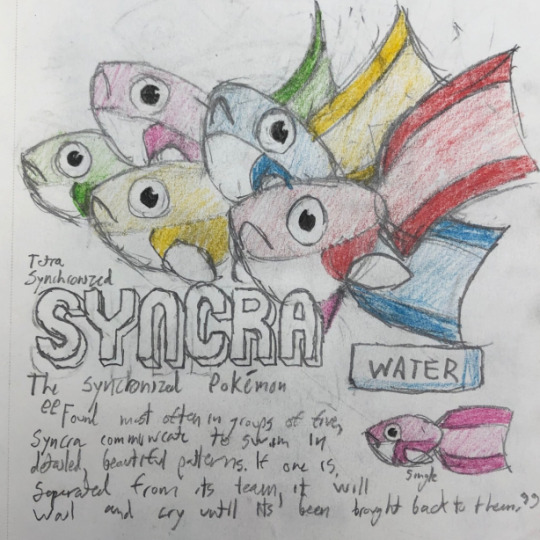
FAKEATHON DAY 27: THE OLYMPICS SYNCRA - Derived from synchronized, tetra
This is similar to wishiwashi, in that it's a schooling mon. But instead of it having a schooling form, it's ALWAYS in a school of five fish, constantly swimming in unison. Clearly based on synchronized swimming, I wanted the tails to be super long, so they'd flow all elegantly when they maneuver around. Kinda... power rangers in execution, innit
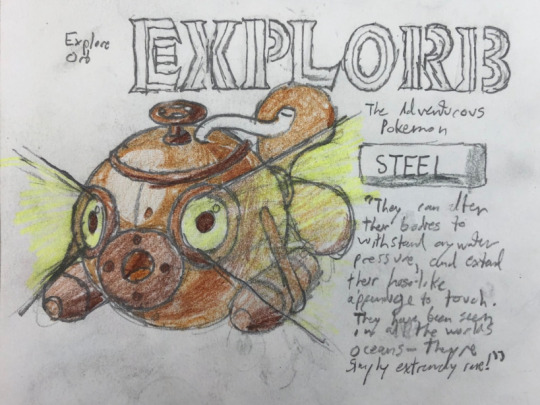
FAKEATHON DAY 28: THE OCEAN EXPLORB - Derived from explore, orb
The idea to turn the bathysphere into a pufferfish-like dude just came together really clearly in my head. I imagine their attack would be terrible but their defence would be amazing - basically, they aren't out to fight, they just wanna explore the oceans :3
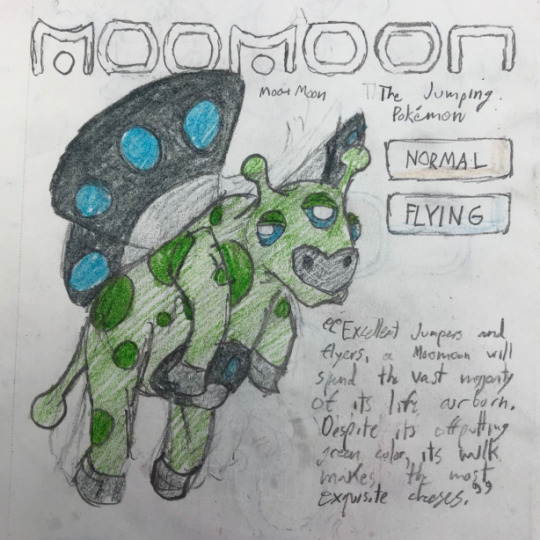
FAKEATHON DAY 29: THE MOON MOOMOON - Derived from moomoo, moon
its the cow that jumped over the moon

FAKEATHON DAY 30: LEGENDARY CORRA - Derived from core, cor (latin for heart), terra
I figured, we’ve done every part of the earth this challenge… except the interior. So for the legendary representing the world, I based mine on the core of the earth. The body itself is meant to resemble the phylotypic stage of an embryo - the stage of development where most species are virtually identical. It cannot leave its lava bubble. At the center of its body is a heart glowing with all the colors of magma.
The FIRST person to make a legend of korra joke is getting slapped
13 notes
·
View notes
Photo

I removed some books today.
I think of myself as a minimalist, but that doesn’t happen to be true. I have acquired more books than I will ever read. They still sit, stacked and unreachable, in piles by the walls, two dozen books tall and sometimes two books deep.
I don’t think I know where they all came from. I think more came from online than from any physical store. I bought them from Abebooks, the sales search platform that Amazon owns now. Abebooks tell you the names of the sellers, but they seem unconnected to any real place.
From Better World Books. From Thrift Books and Bookbarn. From Silver Arch Books, Motor City Books, Free State Books, Sierra Nevada Books, Yankee Clipper Books, and the Atlanta Book Company. From Green Earth Books and Housing Works Books. From Goldstone Books and Powell’s Books and Kennys Bookshop and Art Galleries. From Satellite Books and the Orchard Bookshop. From Blue Cloud Books and Hippo Books and Wonder Book.
They’re from all over, from places you’ve never been, places you’ll never be. They’re names on a box. But then there are the books from more intimate places, intimately connected
From library’s old bookstore, which sold paperbacks for fifty cents, hardcovers for a dollar. From the basement of the old independent bookstore down on Front Street, where they sold remaindered and overstocked books marked down with red-orange tape. From the thrift store across the street, which charged too much.
From the Chapters at the mall in your hometown, or the Chapters and Indigo in the places you’ve been to, from the shelves of marked-down items where you looked for bargains, for the books you knew you should read, and all the books you never would. Places where you could drink sweet cream and coffee and pretend to read.
From the Borders in Syracuse, where you idled while the family went to the fair, where they always said they were going to build the largest mall in America, but never did. There was another Borders in South Florida, where they were stripping fixtures from the walls because the books had not sold, and so the Borders had to be. They still have bookstores. I’m not sure what they sell now. Postcards, I think.
The books still in my room had postcards from people I will never know, dedications to people I will never see, business cards from people who have moved on to other work. But their spines are unbroken, their pages unmarked. I guess I wanted them that way. I bought them like that.
I sometimes worried they would break through the floor. I would wake up to the collapse of everything I have ever owned as I plummeted a few short feet to my death. I guess it would probably take longer than that. I would have to wait for them to crush me. That mass of books would fall on me, blotting out the light. Crushed beneath nearly everything I have ever owned.
That’s what happened to the clerk Toshiko Sasaki in John Hershey’s Hiroshima, who was seated at her desk on August 6, 1945, in front of a couple of bookcases from the factor library:
Everything fell, and Miss Sasaki lost consciousness. The ceiling dropped suddenly and the wooden floor above collapsed in splinters and the people up there came down and the roof above them gave way; but principally and first of all, the bookcases right behind her swooped forward and the contents threw her down, with her left leg horribly twisted and breaking underneath her. There, in the tin factory, in the first moment of the atomic age, a human being was crushed by books.
Miss Sasaki made out alright, although not so well as to not ask the question “If your God is so good and kind, how can he let people suffer like this?” But then, I have more books than she did.
I removed some books today. I still have more I want to remove. I just don’t have the boxes for them. I took the boxes I did have in the back of my car to a mass-market thrift store, where they will end up on the shelves by the leather jackets.
Perhaps they will end on some other shelf, like a postcard from somewhere unknown, in someone else’s memory. But I don’t think they will. I don’t think they’ll sell. There aren’t enough people here who spend money pretending to read.
I don’t know what will happen to them. I suppose they will pulp them. Or perhaps they will end in a landfill, crushed beneath their own weight, suffocating beneath the earth we have made for them until life reclaims them.
I wrote out a partial list of the books I threw out. I don’t know what it says about me. There’s a double significance here: These are books I bought, for some amount of money, but these are also books I am throwing away, because I asked the question the woman told me to ask, which was whether they sparked joy, and I answered no.
Those books in the photo are the books that have not yet been thrown away. Here, below the fold, are the books that have:
Judith Fitzgerald’s Sarah McLachlan: Building a Mystery
Mordecai Richler’s Oh Canada! Oh Quebec!
Jonathan Coe’s The Rotter’s Club
Misha Glenny’s McMafia
Joinville and Villehardouin’s Chronicles of the Crusades
Michael Ignatieff’s The Lesser Evil
Russell Dalton’s Citizen Politics in Western Democracies: Public Opinion and Political Parties in the United States, Great Britain, West Germany, and France
Richard Finn’s Winners in Peace: MacArthur, Yoshida, and Postwar Japan
Ramachandra Guha’s India After Gandhi
Fox Butterfield’s China: Alive in the Bitter Sea
Anthony Sampson’s The Changing Anatomy of Britain
Masanori Hashimoto’s The Japanese Labor Market in a Comparative Perspective with the United States
Donald Keene’s Dawn to the West: Japanese Literature of the Modern Era: Poetry, Drama, Criticism
Andrei Shleifer’s Without a Map: Political Tactics and Economic Reform in Russia
Peter Newman’s The Secret Mulroney Tapes
Nicholas Negroponte’s Being Digital
Lesley Downer’s The Brothers: The Hidden World of Japan’s Richest Family
Harold Vogel’s Entertainment Industry Economics
Stephen Goldsmith and William D. Eggers’s Governing by Network: The New Shape of the Public Sector
Donald Harman Akenson, Saint Saul: A Skeleton Key to the Historical Jesus
Philip Ziegler’s King Edward VIII
David Wessel’s In FED We Trust
Robert Dallek’s Flawed Giant: Lyndon Johnson and His Times, 1961--1973
David Halberstam’s The Reckoning
David Bell’s The First Total War: Napoleon’s Europe and the Birth of Warfare as We Know It
Kevin Phillips’s The Cousins’ Wars
Yirmiyahu Yovel, Spinoza and Other Heretics: The Adventures of Immanence
Michael Oren’s Six Days of War: June 1967 and the Making of the Modern Middle East
Lawrence McDonald’s A Colossal Failure of Common Sense: The Inside Story of the Collapse of Lehman Brothers
Richard Posner’s The Crisis of Capitalist Democracy
William Chester Jordan’s Europe in the High Middle Ages
William Cohan’s House of Cards: A Tale of Hubris and Wretched Excess on Wall Street
Bryan Burrough and John Helyar’s Barbarians at the Gate: The Fall of RJR Nabisco
Linda Lear’s Beatrix Potter: A Life in Nature
Jane Mayer’s The Dark Side: The Inside Story of How the War on Terror Turned into a War on American Ideals
Allan Brandt’s The Cigarette Century: The Rise, Fall, and Deadly Persistence of the Product That Defined America
Garry Wills’s Head and Heart: American Christianities
Sarah Bradford’s Elizabeth: A Biography of Britain’s Queen
Andrew Gordon’s The Evolution of Labor Relations in Japan: Heavy Industry, 1853--1955
John Ardagh’s France in the New Century: Portrait of a Changing Society
Bob Woodward’s The Agenda: Inside the Clinton White House
John Julius Norwich’s Byzantium: The Early Centuries
Taylor Branch’s Pillar of Fire: America in the King Years, 1963--65
Michael Lewis’s Liar’s Poker
Tim Blanning’s The Pursuit of Glory: Europe, 1648--1815
Robert Fagles’s translation of Virgil’s The Aeneid
Karl Popper’s The Poverty of Historicism
P. D. Smith’s Doomsday Men: The Real Dr. Strangelove and the Dream of the Superweapon
Richard Rhodes’s Arsenals of Folly: The Making of the Nuclear Arms Race
Margaret Thatcher’s Downing Street Years
Alistair Horne’s Harold Macmillan, 1957--1986
Taylor Branch’s The Clinton Tapes: Wrestling History with the President
Ian Kershaw’s Hitler, 1936--1945: Nemesis
David Grossman’s To the End of the Land
Sean Wilentz’s The Rise of American Democracy: Jefferson to Lincoln
Philipp Blom’s The Vertigo Years: Europe, 1900--1914
Jacob M. Schlesinger’s Shadow Shoguns: The Rise and Fall of Japan’s Postwar Political Machine
Peter Jenkins’s Mrs. Thatcher’s Revolution: The Ending of the Socialist Era
Martin Lawrence’s Iron Man: The Defiant Reign of Jean Chrétien
Marin Lawrence’s Chrétien: The Will to Win
Alastair Campbell’s The Blair Years
Tony Blair’s A Journey
David Kennedy’s Don’t Shoot: One Man, a Street Fellowship, and the End of Violence in Inner-City America
Joshua Ferris’s Then We Came to the End
Kate McCafferty’s Testimony of an Irish Slave Girl
Martin Wolf’s Why Globalization Works
Charles Fishman’s The Wal-Mart Effect: How the World’s Most Powerful Company Really Works -- and How It’s Transforming the American Economy
William Easterly’s The White Man's Burden: Why the West's Efforts to Aid the Rest Have Done So Much Ill and So Little Good
Karel van Wolferen’s The Enigma of Japanese Power: People and Politics in a Stateless Nation
Jeffrey Sachs’s The End of Poverty: How We Can Make It Happen in Our Lifetime
39 notes
·
View notes
Photo

Bibliothèque Infernale presents:
HOW ELEVEN CHINESE DEVOURED THEIR BRIDE (1926) —A grotesque, infamous short story by HANNS HEINZ EWERS
This is a story about sodomy and bestiality. Most people don’t understand such things and don’t like them. That’s all right, but, if you were born a Tartar there would be no question that sodomite stories are always very funny.
If a case comes before the court, the Judge, Public Prosecutor, clerk, Lawyer and curiously even the Justice of the Peace all see the humor in it. Only the public can’t see the humor. It is out of the question because the morality of the Public must not be endangered in any way.
So enjoy this mild story of our black gowned family. Naturally it is a light hearted story that will not seduce anyone into sodomy or bestiality. Especially when he sees how this abomination can get a poor devil stuck into prison for a couple years just for a small bit of pleasure.
That is still mild and humane says the Law. Things were not always so light. We read that our dear God rained both pitch and brimstone on the contaminated cities of Sodom and Gomorrah destroying them to the ground.
Only the noble Lot and his daughters were spared. His wife was turned into a naked pillar of salt simply because she once turned to look back toward these abominable cities.
Now the Lot family was not completely morally strong all the time. The behavior of the God fearing family was such that the one and only God sent angels to deliver them from this decline into abomination. How their countrymen desired these messengers and wanted to go out with them! Lot got them drunk and pleaded with them to take his daughters and use their blessed wombs instead!
How do you say, they looked pretty only after you had a few drinks?
Nevertheless this is a funny enough story in spite of all the pitch and brimstone. Funny too are the sodomite abominations in our time.
Yet they have been horribly punished. Sodomites have been crucified, quartered, drowned, broken on the wheel, burned at the stake and still they exist in all parts of the world. The weed of sodomy and bestiality is constantly new and blooming over the entire world. No pure gardener of high morals has ever been able to eradicate it from the garden of humanity.
Impassioned human lust will always explore all possible desires of the flesh. The beat of time appoints individuals across the country and in the city. Soon here, soon there, the false God, Sodom, needs a sacrifice.
The second half of the 11th century was a blooming period for sodomy and it existed in the Order of the Templars, the infamous secret sodomite society. A small group of sodomites existed as well in Sicily and the Abruzzo. The head of their organization was in India.
Today in southern China a pretty piece from Tunis and far into the Caucasus exists an abominable city of sodomy with a temple that holds all their secret love techniques. It has followers in all the large cities of the world.
In all countries, in one city or another there is a place where sodomy and bestiality are now blooming. First it is a bird, then a four footed beast that is strangely popular.
In the Rhienland in the old city of Mettmann the court is known for producing such amusing cases and almost as amusing punishments. The worthy citizens complain to the court and curse that which I applaud!
My friend, Justice of the Peace John, wanted to write his doctoral thesis about it.
“The Origin and Cultural Development linking the district of Mettmann to the second paragraph of Statute 175 R.-Str.-G.-B from the 12th century to today.”
But the Heidelberg Judicial Faculty had little sympathy for this theme. They suggested he choose to write instead about the indebtedness of the District Hubbelrath to the movement of the common people which is certainly very important but not half as humorous.
No one can deny that there is a humorous side to every single case of sodomy or bestiality. From the “Golden Ass” of Apuleius into modern times there is a long chain of droll and amusing anecdotes. These are all harmless crimes. It is a crying shame that medical knowledge never applies in these cases. In criminal law books all around the world the worst tortures known can be found.
These are promoted not only by the common people but by the higher class, the so-called educated rabble. The sturdy masses merely see these incidents as humorous. Boccaccio, Aretino, Voltaire, Goethe and Balzac all have highly polished jokes about it.
Heine’s sarcastic poem begins:
“Zu Berlin im Alten Schlosse
Sehen wir in Stein gemetz,
Wie ein Weib mit einem Rosse
Sodomitisch sich ergötzt.”
[Translator’s note:
“In an old castle in Berlin
We see chiseled in stone
How a woman with a steed
Amused herself through sodomy.”]
The Royal family has never forgotten this mockery of their illustrious ancestor depicted in this joke as a steed lustful woman. Who can really be further offended? Friedrich the Great had a great laugh over it even though he stopped work on Voltaire’s rough draft of him with his greyhounds because it was not to his taste.
He found himself in good company with Voltaire’s “Pucelle”, which depicted the virgin, Joan of Arc, after her conquest of Orleans riding an ass into a bedroom. Voltaire really intended the love as only allegory and the ass signifying the Catholic Church.
Such humor is known to date from the 18th century and while not appreciated by the common folk was by the Lords that ruled over them. They rewrote the language and revised an old judgment where a poor fellow that had been caught in obscenities with a goat should be burned at the stake. “The offender must burn,” so declared the Law. The clever Lords revised it to read, “The goat must burn”.
Friedrich the Great was an animal lover with a great sense of humor. When a cavalry member was caught making love to his mare he hung them both along with a sign that read, “The fellow wanted to be transferred to the infantry”. Today he would hardly be reported by his comrades.
The sodomy and bestiality in hidden bloom during World War I was so pervasive there were constant jokes about it. A cow is called Mrs. Sergeant-Major Lieutenant in the East and such four legged soldier wives exist in all armies around the world.
That is simply the way things are and no cleric or Judge can change it. Everyone knows that centaurs, fauns, and other mythological beasts come from the interbreeding of human and animal species. We all know they come about through this horrible obscenity but no one really sees any wrong in it.
It is the same with this incidentally full blooded adventure of the eleven Chinese that I will now relate. This story of strange love is not meant to be taken in an evil way.
So, there were these eleven Chinese in Chicago-
But no, I must begin it differently. My friend Fritz Lange lived in Chicago. He owned a laundry business. Really he was a land assessor and gambled on the hounds, but not in this story.
Over in America a man can do what he wants. He can be a waiter, dishwasher, bill poster, carriage maker or anything. Fritz finally had some luck and married the daughter of a Laundry owner. He began working there to learn the business so that when the old man died he could take over and do well with it.
Now he had built it into a mighty laundry business with a dozen pickup and delivery points scattered throughout the city. One day he came to me very excited. I needed to help him. Eleven of his workers had been arrested. Chinese naturally, they are equally the best and the cheapest washers in the city. I could help him because I knew the criminal Judge that had the case.
It was Judge Mc Ginty, whom I played stud poker with twice a week. Now Mc Ginty was a sociable man and liked to talk. He didn’t want the eleven fellows to get off easily and it would be hard to get them released. The eleven Chinese were confined because they had beaten up a God wretched pathetic red-haired fourteen year old Irish rascal named Jackie Murphy.
“Why did they beat him up?” I asked.
“He seduced the bride,” said Fritz Lange.
“That’s not going to be good,” I opinioned. “Judge Mc Ginty is very much a son of Erin and will certainly decide for the young rascal against the yellow brothers. Still, many a man can be persuaded by whiskey.”
“It is so dangerous!” My friend Lange cried. “The bride, that’s what my Chinese call her! The bride is not the bride of just one, but strangely of all eleven! To them she is not just a feminine being of white or yellow color! In short, the bride of the eleven is not human. To be entirely correct she is curiously enough a four legged sow!” “And Jackie seduced her?” I asked.
“Entirely correct,” nodded the land assessor. “The Chinese here live on nothing. They only save and save through the day and through the year until they have enough to go back home with a full purse. There is only one thing they can’t renounce and that is the desires of the flesh in any form. They are horny as apes and can’t stop themselves. They must have something so the eleven fellows went out and bought a pig. From an economical standpoint it is certainly a clever idea, you could scarcely find anything cheaper.
They all live together in a basement apartment and the sow lives there with them. Jackie, the son of the house manager, was hiding and saw the entire obscenity go down. Then, when my Chinese were at work he snuck into the cellar and climbed into the circular pen with their lover. With him it made an even dozen. When the Chinese found out the jealousy grew so strong in their love-struck fruitcake souls that they beat the red-haired rascal half to death.”
“Thunderation!” I cried. “That looks very bad. Does Judge Mc Ginty know all this?”
“Naturally he knows,” answered Fritz Lange. “Jackie’s father had the Chinese arrested. They apologized for the atrocity and for mishandling the boy but when they found out they were going to prison they started screaming that Jackie was the 12th and in league with them. That’s when he first learned from the Chinese what really happened.”
“What will the outcome be?”
“Twenty years in prison is the minimum according to the Law in the State of Illinois. They are not as mild here as they are across the ocean! And I have lost my best workers! But there is still a chance. The case is still with the police and has not yet gone to court. I’ve always been on friendly terms with the police. I need you to take this to Judge Mc Ginty.”
He reached into a bag and brought out a large piece of Nephritis, Imperial Jade, of the most glorious green color and wonderfully cut into the shape of an enormous turkey. It was easily worth more than a few hundred dollars.
“Here,” he cried. “The fellows have given me this. It is something very valuable that can possibly get them out of this jam. Take this to Judge Mc Ginty; I think he will talk with you.”
So I took the stone and went to Mc Ginty but he was not home. His wife greeted me. She was pretty and distinguished despite being fifty-four years old and she understood the situation. I gladly showed her my lump of jade and her eyes got bigger and bigger.
“I received this as a present,” I said weakly. ” I wondered if your husband was interested in it. I could really use a few dollars right now.”
At that moment Mc Ginty came.
“Buy it!” His wife cried out to him. “I’ve been wishing for a piece like that for many years. He’s letting it go really cheap, only-“
The Judge took the glorious piece and set it down on the table.
“Come with me,” he said. “I don’t want her to hear our little chat.”
He took me around back despite the pleading of his wife who stood with both hands clasped together in front of her.
“God, I’ve got fifty dollars,” she cried after us.
“What’s this about?” He asked me out on the street.
“It’s like this,” I said. “You know about those Chinese that were arrested yesterday. My friend Lange needs his workers and wants them released. The fellows gave him this stone to sell so they could get some money for their defense.”
Mc Ginty looked at me sharply.
“I know it’s not right-, “he began. “What do you know about this?”
“Nothing special,” I lied. “They beat up a fourteen year old.”
“Nothing else?” The honorable Judge asked.
He winked at me and gave me a poke in the ribs.
“Nothing that I can remember,” I laughed.
Judge Mc Ginty chuckled, and then he said. “Good, I will buy this stone because my wife wants it so badly. But I can’t give you more than ten dollars for it. There, that is enough for your defense. Go quickly to Jim Mc Namus, the lawyer, you know him. Give him the ten dollars-wait a minute,” He put down another. “There, he gets one for each. The rascal Murphy must defend his son because he is Irish, he won’t talk.
Tell Mc Namus to be in court at 6:00 this evening to get this over with quickly. Now, please excuse me. I must go to my wife and bring her this little thing she is so madly in love with.”
He played with the stone on the table.
Judge Mc Ginty knew what he was talking about. I was at the criminal court that evening. A policeman said that the eleven coolies had beaten the young Murphy. The rascal said nothing. The Chinese said nothing. The defense asked for a mild sentence.
Judge Mc Ginty ruled that each pay a dollar to the state and another in damages to the father of the youth. Fritz Lange immediately paid the twenty-two dollars and another twenty-five for the cost of the proceedings. Everyone went home happy. It didn’t take over five minutes.
A week later Fritz Lange stopped by. I should go with him to his Chinese, he said. They wanted to thank me. So I went with him. We went down into the cellar, all eleven were there and so was the young red-haired rascal Murphy.
They were very polite to me, offered me Saki and a little rice. Then the feast began. It was pork sausage. They had been taken in once and paid dearly.
“We are not doing that again,” they said.
So they slaughtered their bride, and consumed her with enviable appetites.
I like to think that I am moderately open minded and unprejudiced. I am no food critic, but it was a bit too much for me.
*Von elf Chinesen und ihrer aufgefressenen Braut. Hanns Heinz Ewers ~ 1926
“How Eleven Chinese Devoured Their Bride”: translation copyright Joe E. Bandel
Original German version, via Spiegel Online Kultur: gutenberg.spiegel.de/buch/grotesken-7613/3
Image: Hanns Heinz Ewers, ca.1900: “Blood is Life”
19 notes
·
View notes
Text
The GreatDrams Review of 2019
let’s begin
Welcome to The GreatDrams Review of 2019, a time for me to have a swift light hearted reflection of the year that was and my personal highlights of the year.
Well what a year it has been; Boris Johnson became Prime Minister – and royally wasted everyone’s time and energy, Brexit is still a thing and is still polluting our lives on an hourly basis, my beloved Liverpool FC won the Champions League and only narrowly lost out on the Premiership – something I hope they can rectify this year, our boy Archie has continued to grow into a fantastically energetic boy who loves being awake early and not giving us a break from his Duracell-like energy levels, our village – Poynton – flooded again which was quite disconcerting and the world, of course, is even more fractured than it was last year.
Crazy to even start reflecting on most of the above, but thankfully I only need to reflect on GreatDrams, and of course what’s been going on in whisky.
I say it every year, but this year has been amongst my busiest;
270,000 + GreatDrams readers this year
94k followers across social media and email
8,960 (approx) samples of our products given out at events to thirsty whisky drinkers
1,825 bottles of GreatDrams limited edition Scotch whisky sold to our awesome customers
1,510 articles now on GreatDrams (including a load scheduled for future publishing)
133 hours airborne on planes to presentations and meetings (that’s over five and a half actual days in the air…)
90 hours on trains to meetings (that’s nearly 4 full days spend on trains…)
87 events including Makers Markets and Pub in the Park promoting and selling the GreatDrams independently bottled whiskies
46 trains to meetings in London
32 flights to distilleries and meetings in six countries (India, Scotland, Ireland, Spain, USA and China)
18 distilleries visited across Scotland, Ireland, India, Kentucky
11 casks bought for our independent bottling programme
15 events attended (lower than usual due to hectic consulting schedule and family life)
5 whisky shows and festivals attended
4 publications written for including Whisky Magazine and Drinks International
4 award wins – Double Gold Star for our Girvan 11 Year Old at the Great Taste Awards 2019, Gold Star for our Craigellachie 11 Year Old at the Great Taste Awards 2019, Drinks Producer of the Year at the Cheshire Food & Drink Awards and Best Online Spirits Resource (second year in a row)
4 GreatDrams independently bottled whiskies, BenRiach 5 Year Old, Girvan 11 Year Old (which scored 91.5 in the 2020 Whisky Bible), our Christmas 2019 Limited Edition Blended Scotch Whisky and our Glentauchers 10 Year Old, available here
Countless whiskies tried, enjoyed and commented on.
Some particular highlights
Meeting so many really passionate whisky drinkers at the events we have been doing with our own independently bottled whiskies, hearing such great feedback and seeing the bottles fly off the shelves – our Christmas limited edition especially as it sold out before we even got to the 10th November!
Getting to visit India and Delhi for the first time – a place that can only be described as ‘synchronised chaos’
Visiting Kentucky again, albeit briefly (one day!) was superb
Visiting China twice in twelve weeks was quite intense… I know Shanghai surprisingly well now
Spending time with so many icons of the whisky world including, but not limited to Dr. Bill Lumsden, Richard Patterson, John McCheyne, Fraser Campbell, Stephanie Macleod, Ewan Gunn, Stephen Rankin, Billy Leighton and Brian Nation
In whisky I was fortunate to try some incredible whiskies (in the order in which I remembered them or tried them, not preference);
Bushmills Distillery Exclusive 2019 Whistler Indian whisky concepts Boutique-y Ardmore 19 Year Old Riverset Rye Blue Note Bourbon Aberfeldy 21 Year Old Madeira Aberfeldy 16 Year Old Madeira Aberfeldy 28 Year Old Exceptional Cask Royal Brackla 16 Year Old Aultmore 12 Year Old Aultmore 21 Year Old Aultmore 22 Year Old Exceptional Cask Yoichi Japanese Single Malt Dewar’s Double Double 21 Year Old Dewar’s Double Double 27 Year Old Dewar’s Double Double 32 Year Old James E Pepper 1776 Rye Forest Whisky Blend 001 Forest Whisky Private Cask 001 Ailsa Bay 1.2 Wolfburn Aurora Dewar’s Caribbean Smooth Aberfeldy 20 Year Old Self Fill Silkie Irish Whiskey Johnnie Walker Black Label Aberfeldy 17 Year Old BYO Jura Seven Wood Whisky Works 29 Year Old Glaswegian Single Grain Whisky Works 10 Year Old King of Trees Pure Scot The Glenlivet Triple Cask Rare Cask Craigellachie 21 Year Old Hotel Arran 10 Year Old NEW Glen Moray 21 Year Old Glen Moray Rhum Agricole Jameson 18 Year Old NEW Midleton Barry Crockett Legacy Aberfeldy 20 Year Old Exceptional Cask Lakes Whiskymakers Edition #1 Lagavulin 10 Year Old Kininvie Works – Experiment 001 Kininvie Works – Experiment 002 Kininvie Works – Experiment 003 The Balvenie Tun 1509 – Batch 6 Peaky Blinders Irish Whiskey Royal Salute Snow Polo Teeling Chinquapin
Along with all these stunning whiskies and a very busy year, we have seen Scotch exports up, volumes up and huge investment into new and expanding distillery operations throughout Scotland and Ireland in particular, with many new distilleries opening up in England too.
2020 looks to be another busy year with many new distilleries having spirit old enough to start releasing their first bottlings after three or more years of patience, and I’m sure a degree of nervous anticipation.
Thanks for reading, following, liking, Tweeting, Facebooking, Instagramming and tagging GreatDrams across the web this year, I’ve had a blast and it’s been so lovely to help so many GreatDrammers with their whisky choices and to meet a fair few of you at events around the UK over the last twelve months.
As always, please do send me pics of your whisky exploration, or tag me in festivities so I can share with the wider GreatDrams Network and please also keep sending your feedback, questions and comments to me, I reply to every single email I get sent; [email protected].
The post The GreatDrams Review of 2019 appeared first on GreatDrams.
from GreatDrams https://ift.tt/36kjHZP Greg
2 notes
·
View notes
Text
Flavored Syrups Market - Industry Analysis, Market Size, Share, Trends, Application Analysis, Growth - Global Forecast 2021 - 2027.
Market Overview
Market Research Future's newest report on the global flavored syrups market predicts consistent growth for the market. Used extensively in a wide variety of F&B applications, flavored syrups presently can be found in almost every imaginable flavor. Consumer demand for flavored syrup has grown considerably due to innovative food and beverage trends which use novel flavors to their products. For instance, Starbucks often has innovative flavored drinks such as pumpkin spice and Irish cream that inspire consumers and result in demand for the same.
Available both naturally and artificially flavored, these syrups are in high demand due to their concentrated flavor and flexibility of use. They can be added to bakery products, beverages, frozen desserts and others. Used extensively to make flavored lattes, cakes, and as toppings for waffles and pancakes, the demand for popular flavors and classic flavors has grown exponentially due to growing demand for the above-mentioned food items. A rapidly growing population with rising disposable incomes has resulted in increased demand for trendy food items. Flavored syrups are also used in cocktails, packed juices and along with novel home carbonation machines so that consumers can create their own sodas. Product promotions and increasing innovations in flavors are expected to offer opportunities for growth. Moreover, the demand for healthier syrups sweetened with sugar alternatives, and containing fewer artificial ingredients will likely impact the market positively in the coming years.
Competitive Landscape
Prominent players in the market which use various leading market strategies and are included in MRFR’s competitive analysis are Kerry Group Plc., Sensient Technologies Corporation, Concord Foods Inc., Monin, Inc., Wild Flavors, Inc., The Hershey Company, and Tate & Lyle Plc.
Market Segmentation
The global market for flavored syrups is segmented on the basis of product type, flavor, application, flavor type, and region. By product type, the market is segmented into natural and synthetic syrups. Synthetically produced syrups account for the most significant share of the market due to the low cost of production associated with them combined with the easy availability of the same.
By flavor, the market is segmented into chocolate, vanilla, herbs & spices, coffee, fruits, maple, and others. Among these, the chocolate flavor segment dominates the market due to high consumer preference.
By application, the market is segmented into dairy & frozen desserts, beverages, confectionery & bakery products and others. Bakery & confectionery account for the largest share due to the extensive use of flavored syrups to achieve various flavored baked items. Meanwhile, the dairy & frozen desserts segment is expected to witness the highest growth rate.
By flavor type, the market is segmented into sweet, savory, sour, and others. Sale of sweet syrups is expected to drive the market significantly and accounts for the largest segment.
Access Full Report Details and Order this Premium Report @
https://www.marketresearchfuture.com/reports/flavoured-syrups-market-4326
Regional Analysis
North America accounts for the majority share of the global market due to the increased demand for flavor additives from the developed countries in the region. The presence of a massive and highly competitive F&B sector is expected to drive the demand for innovative flavored syrups.
There is a high production volume of flavored syrups which is a key contributor to the regions leadership position. Europe with its comparable growth pattern and high disposable income is another leader in the global flavored syrups market. The biggest importers of flavored syrups include the U.S, the U.K, Germany, China, and Canada.
NOTE: Our Team of Researchers are Studying Covid19 and its Impact on Various Industry Verticals and wherever required we will be considering Covid19 Footprints for Better Analysis of Market and Industries. Cordially get in Touch for More Details.
About Market Research Future
At Market Research Future (MRFR), we enable our customers to unravel the complexity of various industries through our Cooked Research Report (CRR), Half-Cooked Research Reports (HCRR), Raw Research Reports (3R), Continuous-Feed Research (CFR), and Market Research & Consulting Services.
MRFR team have supreme objective to provide the optimum quality market research and intelligence services to our clients. Our market research studies by products, services, technologies, applications, end users, and market players for global, regional, and country level market segments, enable our clients to see more, know more, and do more, which help to answer all their most important questions.
In order to stay updated with technology and work process of the industry, MRFR often plans & conducts meet with the industry experts and industrial visits for its research analyst members.
Contact
Market Research Future
Office No. 528, Amanora Chambers
Magarpatta Road, Hadapsar,
Pune - 411028
Maharashtra, India
+1 646 845 9312
Email: [email protected]
0 notes
Photo

Birch
Abedul, Arbre de Sagesse, Betula, Betula alba, Betula pendula, Betula pubescens, Betula verrucosa, Betulae Folium, Biole, Bois à Balais, Boulard, Bouleau Blanc, Bouleau Odorant, Downy Birch, Sceptre des Maîtres d’École, Silver Birch, White Birch, Bjørk, Björk, Koivu, Birke
A birch is a thin-leaved deciduous hardwood tree of the genus Betula (/ˈb��tjʊlə/), in the family Betulaceae, which also includes alders, hazels, and hornbeams. It is closely related to the beech-oak family Fagaceae. The genus Betula contains 30 to 60 known taxa of which 11 are on the IUCN 2011 Green List of Threatened Species. Birch species are generally small to medium-sized trees or shrubs, mostly of northern temperate and boreal climates.
The bark of all birches is characteristically marked with long, horizontal lenticels, and often separates into thin, papery plates, especially upon the paper birch. Its decided color gives the common names gray, white, black, silver and yellow birch to different species.
The Proto-Germanic rune berkanan is named after the birch.
Extracts of birch are used for flavoring or leather oil, and in cosmetics such as soap or shampoo. In the past, commercial oil of wintergreen (methyl salicylate) was made from the sweet birch (Betula lenta).
Birch-tar or Russian oil extracted from birch bark is thermoplastic and waterproof; it was used as a glue on, for example, arrows, and also for medicinal purposes.
Fragrant twigs of silver birch are used in saunas to relax the muscles.
Birch leaves are used to make a diuretic tea and extracts for dyes and cosmetics.
Ground birch bark, fermented in sea water, is used for seasoning the woolen, hemp or linen sails and hemp rope of traditional Norwegian boats.
Birch twigs bound in a bundle, also called birch, were used for birching, a form of corporal punishment.
Many Native Americans in the United States prized the birch for its bark, which because of its light weight, flexibility, and the ease with which it could be stripped from fallen trees, was often used for the construction of strong, waterproof but lightweight canoes, bowls, and wigwams.

Birch sap is a traditional drink in Northern Europe, Siberia, and Northern China.

(don’t forget to be thankful for the tree, even when its sap from a package)
The sap is also bottled and sold commercially. Birch sap can be used to make birch syrup, which is used like maple syrup for pancakes and waffles.
Source of Xylitol , a sugar alternative without a tooth decay effect. The name derives from Ancient Greek: ξύλον, xyl[on], “wood” + suffix -itol, used to denote sugar alcohols.
In India, the birch (Sanskrit: भुर्ज, bhurja) holds great historical significance in the culture of North India, where the thin bark coming off in winter was extensively used as writing paper. Birch paper (Sanskrit: भुर्ज पत्र, bhurja patra) is exceptionally durable and was the material used for many ancient Indian texts.

Birches are also associated with the Tír na nÓg, the land of the dead and the Sidhe, in Gaelic folklore, and as such frequently appear in Scottish, Irish, and English folksongs and ballads in association with death, or fairies, or returning from the grave.
Anti-microbial *see research link 25371579
Immune system enhancing *see research link 17451798
Anticancer properties *see research link PMC2658785/
Wound healing ( excerpt from research:” Application of TE (triterpene extract) and betulin 72 h after wounding for 24 h resulted in an improved skin barrier function. “) *see research link PMC3899119/
Contains betulin which has anticancer properties and causes tumor cell to self-destruct *see wiki and research link PMC4383233/
Anti-oxidant *see research link 14672757
Anti-inflammatory *see research link 21396437
Reduces pain *see research link 21396437
Anti-arthritis (Excerpt from research:” Betula platyphylla at 400mg/kg markedly reduced the inflammatory area about 48% in the ankle joints. “) *see research link 21396437
Inhibits the development of atopic dermatitis , will likely also help against mosquito bites (Excerpt from research:” The serum IgE level was also significantly reduced by AWB extract. “) *see research link 18191513
Anticancer properties against skin cancer, ovary cancer, cervix cancer and breast cancer *see research link /PMC3527166/ , 14672757, 10399962
Anti-brain cancer properties ! *tested on human brain cancer lines (excerpt from research:” Here we report that Bet A ( Betulinic acid ) was active against medulloblastoma and glioblastoma cell lines. In addition, Bet A exerted cytotoxic activity against primary tumor cells cultured from patients in 4 of 4 medulloblastoma-tumor samples tested and in 20 of 24 glioblastoma-tumor samples “) *see research link 10399962
Anticancer properties against stage 4 metastases *modified derivatives even more so * see research link PMC5209806/
Antibacterial against S. aureus and E. faecalis. *see research link PMC4102551/
Reduces and inhibits inflammatory immune cells *see research link 21619918
Liver protective against alcohol damage *see research 16227641
Research and tips on Betula:
https://www.webmd.com/vitamins-supplements/ingredientmono-352-birch.aspx?activeingredientid=352&activeingredientname=birch
https://www.ncbi.nlm.nih.gov/pubmed/20707877
https://www.ncbi.nlm.nih.gov/pubmed/25371579
https://www.ncbi.nlm.nih.gov/pubmed/17451798
https://www.ncbi.nlm.nih.gov/pmc/articles/PMC2658785/
https://www.ncbi.nlm.nih.gov/pmc/articles/PMC3899119/
https://en.wikipedia.org/wiki/Betulin
https://www.ncbi.nlm.nih.gov/pmc/articles/PMC4383233/
https://www.ncbi.nlm.nih.gov/books/NBK92761/
https://www.ncbi.nlm.nih.gov/pubmed/18191513
https://www.ncbi.nlm.nih.gov/pmc/articles/PMC3527166/
https://www.ncbi.nlm.nih.gov/pubmed/21396437
https://www.ncbi.nlm.nih.gov/pubmed/14672757
https://www.ncbi.nlm.nih.gov/pubmed/10399962
https://www.ncbi.nlm.nih.gov/pmc/articles/PMC5209806/
https://www.ncbi.nlm.nih.gov/pmc/articles/PMC4102551/
https://www.ncbi.nlm.nih.gov/pubmed/21619918
https://www.ncbi.nlm.nih.gov/pubmed/16227641
https://en.wikipedia.org/wiki/Birch_bark
http://www.tappedtrees.com/
https://nordiskaknivar.wordpress.com/2014/09/02/tuohi-birch-bark-in-finnish-culture-by-eero-kovanen/
http://www.touchwoodrings.com/howto.html
#herbalism#herbcraft#potent antioxidant#antimicrobial#immunesystem#woundhealing#antiinflammatory#atopic dermatitis#anticancer#glioblastoma#skin cancer#ovary cancer#cervix cancer#breast cancer#stage 4 cancer#brain cancer#autoimmune disease#sensitive skin#betula alba#betula pendula#special#trees#beautiful skin#arthritis#metastases
32 notes
·
View notes
Text
Losar
So this weekend here in Nepal was the start of the Tibetan New Year! So happy new year or Losar tashi delek! This past Friday, the 16th, was the first day of the dog year. Technically, Losar (the holiday) lasts for 15 days but the most important days and the ones with all of the celebration are the first three. So i’m going to share what I did with my family to celebrate! Disclaimer I don’t really know why we did everything.
So I’ve only been in Nepal for about two weeks now and I’ve already had a vacation! Because of Losar we had Friday off from class. On Thursday night my family helped me try on some of their old chupas (the black dress thing that I’m wearing in some of the pictures) and there was only one that was long enough on me. It was really fun trying on different undershirts for them to compare colors and tell me what they thought looked best. Eventually, we settled on white even though I liked some of the more colorful shirts better. We also went to this community center type place for dinner with a bunch of other families from the same part of Tibet. We ate tuk pa for dinner which is a soup noodle dish. I had a lot of tuk pa this weekend. There was also this thing called the scapegoat where you put all of your sins/bad luck from the previous year into and then leave it in the street to start fresh for the new year.
The scapegoat deserves it’s own paragraph because there were a lot of parts. When I got to the community center, my aunt took this ball of dough and brushed it on my shoulders and such and then she took a piece of string from the bottom of my pants and told me to squeeze the ball of dough around it. Then I put the dough into this bowl with a figurine of a man in it. Then we ate tuk pa which was made of 9 ingredients and we had to pour some of it into the bowl 9 times. When dinner was over and everyone had done this, the men took the bowl and the figurine to the street to an intersection of three roads. They left it there and had to walk back without looking back. This was all to get rid of all the bad stuff from the year before and start out fresh. I guess in ancient Tibet the scapegoat used to be an actual person that the people would basically beat up, project all their sins onto, and banish from the city. Now it’s a little bit less medieval.
That night at 3 A.M., yes folks I mean 3 in the morning, my ama la knocked on the door and invited me into the prayer room/living room to drink chyang (I knew this was going to happen and told them to really bang on the door so that I would wake up because we all know from experience a.k.a. flushing toilets to try to wake me up for Christmas, that I am not one to get out of bed easily). Chyang is this sweet rice beer and served warm. There are also chunks of (I think) cheese or something in the bottom that I did not eat I was afraid of them. I honestly don’t know how to explain the flavor. It was one of those things that wasn’t bad but I didn’t really want a second serving even though my ama la gave it to me anyway. And compared to some other chyang that I tried this one was pretty good. But yea we all got up and sat together and drank chyang for a little bit and then I went back to bed.
In the morning, we got up, put our chupas on, and walked to a nearby monastery. Here, we did this thing where you grab a pinch of Tsapa flour and tossed it in the air three times then ate a little bit of it. Then we went in and offered kataks, or white silk ritual scarves, to a portrait of the Dalai Lama while a bunch of monks were chanting. It was pretty cool, I have to admit. After this, we went to another monastery and did the same thing. Then there was a huge photo-shoot with every possible combination of people you could imagine. We took so many pictures. And they came out great and are really nice to have it was just kind of funny. When we finished all of the photos and catching up with people, we headed home where a lot of the extended family came over. They set up a tarp on the roof/balcony of my apartment and actually started gambling for approximately 5 hours. I had no money or idea what the game was so I just watched and hung out. Then I took an accidental two hour nap, woke up to eat dinner, and played pizza box with a monk (see previous post).
On Saturday, we went to the community center-type place where my family and some others from the same part of Tibet were all celebrating together. Again, there were lots of card games going on and there were a few other SIT students there with their families so we all hung out for a bit. Then I left with the other Americans to go to the monkey temple for the afternoon and then went back to the community center later to have dinner.
When we got there that night, everyone was singing and dancing. The older women, most of whom were actually born in Tibet (my sisters were both born here in Nepal) were singing a Tibetan song and doing this dance in a circle. The younger women and some men were watching them and following their steps. My host sister said that they don’t know any of the lyrics or the steps by heart, they just follow along. So they were doing this dance around two men who were playing these long guitar-type instruments in the middle of the circle. The steps looked super easy but the song would get faster and faster and they would add in these spins. I tried to do it but was just messing up the flow so I stepped out. This part of the night reminded me a lot of our family gatherings where we end up singing Irish songs and dancing together in the kitchen. It was a very similar vibe.
On Sunday, I donned my chupa once again and we went to the Tibetan opera. This was a huge yellow tent set up in a schoolyard where there was a performance going on all day. Like only a break for lunch and happening all. day. My sister told me that the performers had gotten there at 6 in the morning to get ready and we got there at 9 and it had just started. The performance took place in the middle and the audience kind of sat in a circle around the tent. It started with some men in masks doing a dance and then women came out and there was a combination of some singing, dancing, and dialogue. It was really cool to watch even though I had no idea what anyone was saying. The costumes were really beautiful and colorful and it was fun to see everyone dance. Apparently the performers grow up being in the opera and learning everything about performing. My sister was telling me that they go to practice every Saturday, pretty much all day.
Sunday night there was a party at the place where I have classes basically for all the white people/foreigners in Nepal. It was basically a bunch of old white hippies and another SIT program that goes to a bunch of countries and happened to be in Nepal. It ended up being really fun. There was live music and we all danced and hung out until we had to go home (aka when the band went on a break and our curfew was fast approaching). Shockingly really fun but I guess when you’re surrounded by a bunch of ex-hippie western Buddhists the vibe is pretty chill.
There is something else that I think is worth mentioning. So in the late 50s China invaded Tibet and this led to the Dalai Lama fleeing Tibet followed by something like 100,000 Tibetans in the years immediately after the Dalai Lama went into exile. (for those of you who don’t know, the Dalai Lama is the religious, and political, leader of Tibet/Tibetan Buddhism and is said to be the reincarnation of the boddhisatva of compassion). Most of those Tibetans settled in Nepal and India, hence why this program exists and I am living with a Tibetan family. So I guess that while Nepal is pretty tolerant of different ethnic groups and is actually a pretty multi-ethnic place, there are some issues with the Tibetans, especially since the crazy protests that went on in 2008 and brought a lot of media attention to “the Tibet issue.” So how does this relate to Losar? Well apparently after all of these protests and worldwide media attention, China started giving a ton of money to the Nepali government and started gaining soft power over Nepal as kind of a way to control the portrayal of the Tibet issue. This included an agreement that Nepal would stop any anti-China activity (anti-China wasn’t really ever defined). Well, my sister was telling me that she wasn’t sure if they were going to be able to have the celebration at the opera because of this situation and previous experiences in which the Nepali police shut down large gatherings of Tibetans. This year, the opera was allowed to be held under one condition. There was a stage at the front of the tent where people were offering scarves to a statue of the Buddha. Usually, there is a portrait of the Dalai Lama where the statue of the Buddha was but the police said that the opera could only happen if the portrait was taken down. This may seem like a small thing, but my sister was pissed. It was just kind of a subtle reminder of the situation in Tibet and the control China has over so many things that make it really difficult for Tibetans to live comfortably. To me, it felt like a slap in the face. They left Tibet to escape this kind of cultural suppression and instead still face it in subtle ways that are still violent in some ways. So yea, I just thought that was an interesting aspect of the celebration and served as a reminder that while people have made lives for themselves outside of Tibet, they are still in exile and many of them cannot be with their families during this holiday. For example, my ama la has been trying to get a visa to go see her mother in Tibet before she dies and my sisters have never met their grandmother. It was a wonderful weekend because friends and family all got together to celebrate this fresh start but there is kind of an air of sadness thinking about the possible loss of culture, history, and loved ones.
1 note
·
View note
Text
As I Please, December 20, 1946
in my Sunday paper sets forth in the form of a picture the four things that are needed for a successful Christmas. At the top of the picture is a roast turkey; below that, a Christmas pudding; below that, a dish of mince pies; and below that, a tin of —’s Liver Salt.
It is a simple recipe for happiness. First the meal, then the antidote, then another meal. The ancient Romans were the great masters of this technique. However, having just looked up the word vomitorium in the Latin dictionary, I find that after all it does not mean a place where you went to be sick after dinner. So perhaps this was not a normal feature of every Roman home, as is commonly believed.
Implied in the above-mentioned advertisement is the notion that a good meal means a meal at which you overeat yourself. In principle I agree. I only add in passing that when we gorge ourselves this Christmas, if we do get the chance to gorge ourselves, it is worth giving a thought to the thousand million human beings, or thereabouts, who will be doing no such thing. For in the long run our Christmas dinners would be safer if we could make sure that everyone else had a Christmas dinner as well. But I will come back to that presently.
The only reasonable motive for not overeating at Christmas would be that somebody else needs the food more than you do. A deliberately austere Christmas would be an absurdity. The whole point of Christmas is that it is a debauch—as it was probably long before the birth of Christ was arbitrarily fixed at that date. Children know this very well. From their point of view Christmas is not a day of temperate enjoyment, but of fierce pleasures which they are quite willing to pay for with a certain amount of pain. The awakening at about 4 a.m. to inspect your stockings; the quarrels over toys all through the morning, and the exciting whiffs of mincemeat and sage-and-onions escaping from the kitchen door; the battle with enormous platefuls of turkey, and the pulling of the wishbone; the darkening of the windows and the entry of the flaming plum pudding; the hurry to make sure that everyone has a piece on his plate while the brandy is still alight; the momentary panic when it is rumoured that Baby has swallowed the threepenny bit; the stupor all through the afternoon; the Christmas cake with almond icing an inch thick; the peevishness next morning and the castor oil on December 27th—it is an up-and-down business, by no means all pleasant, but well worth while for the sake of its more dramatic moments.
Teetotallers and vegetarians are always scandalized by this attitude. As they see it, the only rational objective is to avoid pain and to stay alive as long as possible. If you refrain from drinking alcohol, or eating meat, or whatever it is, you may expect to live an extra five years, while if you overeat or overdrink you will pay for it in acute physical pain on the following day. Surely it follows that all excesses, even a one-a-year outbreak such as Christmas, should be avoided as a matter of course?
Actually it doesn’t follow at all. One may decide, with full knowledge of what one is doing, that an occasional good time is worth the damage it inflicts on one’s liver. For health is not the only thing that matters: friendship, hospitality, and the heightened spirits and change of outlook that one gets by eating and drinking in good company are also valuable. I doubt whether, on balance, even outright drunkenness does harm, provided it is infrequent—twice a year, say. The whole experience, including the repentance afterwards, makes a sort of break in one’s mental routine, comparable to a week-end in a foreign country, which is probably beneficial.
In all ages men have realized this. There is a wide consensus of opinion, stretching back to the days before the alphabet, that whereas habitual soaking is bad, conviviality is good, even if one does sometimes feel sorry for it next morning. How enormous is the literature of eating and drinking, especially drinking, and how little that is worth while has been said on the other side! Offhand I can’t remember a single poem in praise of water, i.e. water regarded as a drink. It is hard to imagine what one could say about it. It quenches thirst: that is the end of the story. As for poems in praise of wine, on the other hand, even the surviving ones would fill a shelf of books. The poets started turning them out on the very day when the fermentation of the grape was first discovered. Whisky, brandy and other distilled liquors have been less eloquently praised, partly because they came later in time. But beer has had quite a good press, starting well back in the Middle Ages, long before anyone had learned to put hops in it. Curiously enough, I can’t remember a poem in praise of stout, not even draught stout, which is better than the bottled variety, in my opinion. There is an extremely disgusting description in Ulysses of the stout-vats in Dublin. But there is a sort of back-handed tribute to stout in the fact that this description, though widely known, has not done much towards putting the Irish off their favourite drink.
The literature of eating is also large, though mostly in prose. But in all the writers who have enjoyed describing food, from Rabelais to Dickens and from Petronius to Mrs Beeton, I cannot remember a single passage which puts dietetic considerations first. Always food is felt to be an end in itself. No one has written memorable prose about vitamins, or the dangers of excess of proteins, or the importance of masticating everything thirty-two times. All in all, there seems to be a heavy weight of testimony on the side of overeating and overdrinking, provided always that they take place on recognized occasions and not too frequently.
But ought we to overeat and overdrink this Christmas? We ought not to, nor will most of us get the opportunity. I am writing in praise of Christmas, but in praise of Christmas 1947, or perhaps 1948. The world as a whole is not exactly in a condition for festivities this year. Between the Rhine and the Pacific there cannot be very many people who are in need of —’s Liver Salt. In India there are, and always have been, about 10 million people who only get one square meal a day. In China, conditions are no doubt much the same. In Germany, Austria, Greece and elsewhere, scores of millions of people are existing on a diet which keeps breath in the body but leaves no strength for work. All over the war-wrecked areas from Brussels to Stalingrad, other uncounted millions are living in the cellars of bombed houses, in hide-outs in the forests, or in squalid huts behind barbed wire. It is not so pleasant to read almost simultaneously that a large proportion of our Christmas turkeys will come from Hungary, and that the Hungarian writers and journalists—presumably not the worst-paid section of the community—are in such desperate straits that they would be glad to receive presents of saccharine and cast-off clothing from English sympathizers. In such circumstances we could hardly have a ‘proper’ Christmas, even if the materials for it existed.
But we will have one sooner or later, in 1947, or 1948, or maybe even in 1949. And when we do, may there be no gloomy voices of vegetarians or teetotallers to lecture us about the things that weare doing to the linings of our stomachs. One celebrates a feast for its own sake, and not for any supposed benefit to the lining of one’s stomach. Meanwhile Christmas is here, or nearly. Santa Claus is rounding up his reindeer, the postman staggers from door to door beneath his bulging sack of Christmas cards, the black markets are humming, and Britain has imported over 7,000 crates of mistletoe from France. So I wish everyone an old-fashioned Christmas in 1947, and meanwhile, half a turkey, three tangerines, and a bottle of whisky at not more than double the legal price.
-- George Orwell
5 notes
·
View notes
Photo

“Arrack, arak, raki, arkhi. It is confusing. These are not all the same spirit, and people have been getting them mixed up for as long as international travel has brought them to the attention of international travelers. Arak and raki are middle-eastern grape-based spirits flavoured with anise. Arkhi, from Mongolia, on the other hand is distilled from koumis, fermented mare’s milk, that is frequently described as one of the least-pleasant beverages ever consumed for pleasure. And arrack was once a Hindi umbrella-term for all distilled spirits. One intrepid explorer wrote in 1825: “The natives call our gin English arrack.” But arrack is not all spirits.
Although its birth is lost in history, there is no doubt arrack is one of the world’s oldest distilled spirits. It predates Scotch and Irish whiskey. It predates gin and genever. After Marco Polo commented about it in his memoir Il Millione, it was brought to Russia by Genoese merchants a century before the Russians’ love of mead and beer was replaced with a taste for distilled spirits. In fact, it is the parent of vodka.”
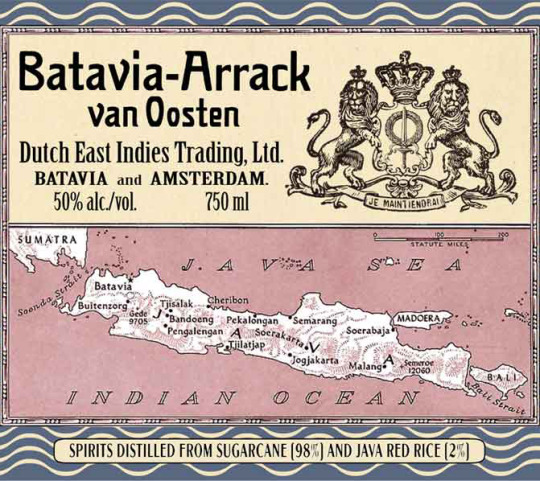
“Produced on the island of Java, Batavia arrack is distilled from molasses and water, using dried cakes of red rice and botanicals that contain yeast and other fungi spores that trigger the fermentation process. This technique can be traced back thousands of years to China and even predates the birth of distillation. The fermented molasses mixture is then distilled in traditional pot stills. The Dutch East India Company, in 1619, laid claim to Java and renamed the capital city Batavia. A name it would hold until the Japanese occupation, in 1942, when it was titled Djakarta.
So, why did such a popular spirit vanish? The first blow was taxation. By the early 1800s protectionist import taxes were levied against spirits imported from the east, giving an enormous advantage in Europe, then the world’s richest market, to Caribbean and American rum producers. The British East India Company went so far as to ban the transport of arrack on its ships except for consumption on board. Rum production grew exponentially, while arrack production gradually faded.”
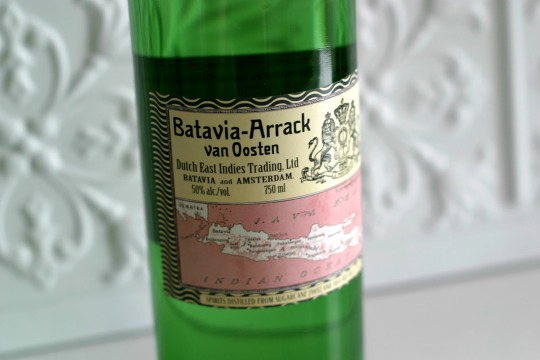
“During the Second World War, the Pacific theatre witnessed horrific battles, and most arrack production ceased. In some places, like in Goa, it disappeared completely. In Java, it nearly disappeared (exports were almost solely sold to China and Sweden), but has come streaming back onto the world market only in the last few years. Despite the external pressures, it is odd that arrack disappeared.
Now that arrack has once again emerged, it is important to understand the differences between the two primary styles (differences that make them less alike than vodka and gin, for example). Batavia Arrack is a heavy, funky uncle of dark rum. It is oily and unrefined, rich both in pleasant flavours and harsh impurities. Ceylon Arrack, by contrast, is a remarkably refined, soft and subtle spirit. It has hints of Cognac and rum character and a wealth of delicate floral notes, and would likely run screaming from a glass of its coarse Batavian namesake. (This style is not to be confused with Philippine Lambanog, which is distilled from coconut palm sap, but has more in common with moonshine and is rarely seen outside of the Philippines.)”
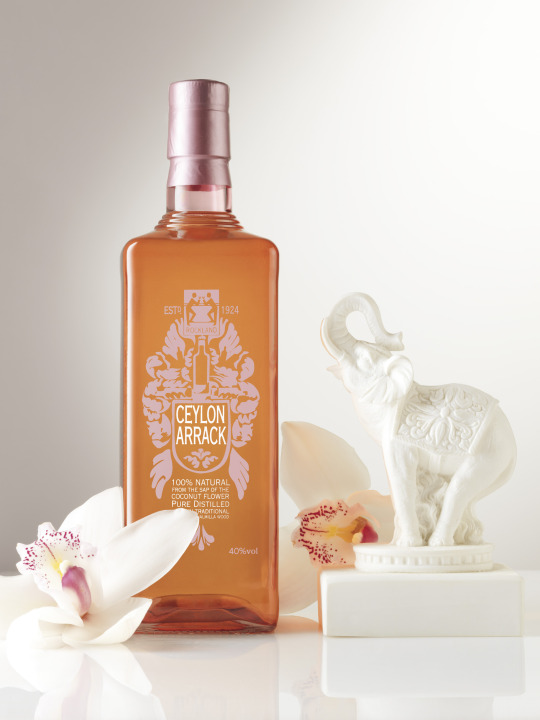
Rediscovering the World’s First Luxury Spirit: Batavia Arrack
“Batavia arrack is still sold, if not widely, and is even undergoing something of a renaissance in the English-speaking world, if only because after years of being completely unavailable it is now available. We know that Batavia arrack is made on the Indonesian island of Java from molasses and rice and that it’s shipped to the Netherlands, Indonesia’s former colonial ruler, where it’s aged and blended and bottled.”

“Making alcohol from grain is much more difficult than making it from fruit or sweet sap, because only sugar will ferment, and grain has no sugar. What it does have is starch, which can be converted to sugar with a little work. In Europe, the process people used to do that was malting: artificially sprouting the grain, which triggers enzymes that convert the starch to sugar, and then toasting it to kill the sprout before it can use up all that sugar in growing.
In China, however, they found a different way. Chinese distillers have brought grain to fermentation by incorporating a fermentation-starter, a cake of rice or wheat that has been allowed to mold under controlled conditions (certain molds produce the same enzymes that malting does). These cakes, qu or chu, also attract yeast, so they both turn the starches to sugar and start the sugar fermenting.”
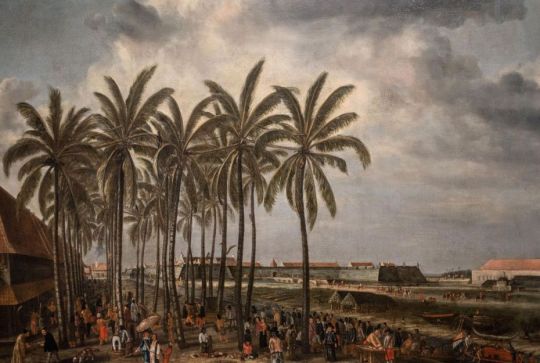
“In 1596, the first Dutch scouting-trading expedition made it to the East Indies. When they explored Java, they found an island newly fallen to Muslim conquest, its traditional Hindu kingdoms all replaced by loose rule from Muslim-dominated trading towns along the north coast... The Dutch first made their base at Bantam, near the western end of the Island, a bustling trading port the size of Amsterdam with a large, new Chinese population (a “very subtle and industrious people,” as the Dutch report on the voyage put it).
The Fujianese were making “much aqua vitae of rice and Cocus [i.e., coconut-palm sap].” The mixture of raw materials was a known technique in Chinese distilling; indeed, in parts of China qu was mixed with grapes to start fermentation. This seems to be what was going on in Bantam: The Chinese were adapting their techniques to local materials, stretching out their traditional rice spirit with the cheap and abundant local palm wine.”
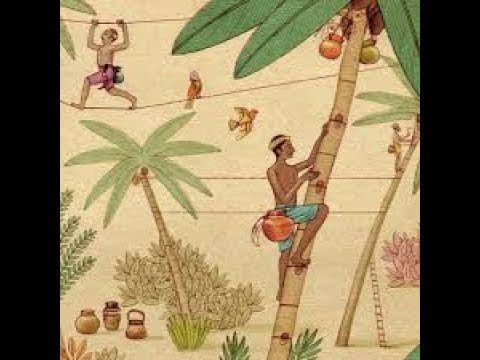
“There was nothing like it in Europe, where almost all the spirits had to be distilled with pungent botanicals—either juniper berries, aniseed, caraway, or mint, or some complex mix of medicinal herbs—just to hide the taste of the raw spirit. But the Chinese had been distilling for over a millennium and knew how to get a clean spirit, and a strong one: most of the European spirits were single-distilled, as was palm arrack, while the Chinese generally did a double distillation. Yet this spirit wasn’t fully Chinese, either: Palm wine wasn’t a Chinese ingredient, and it brought a sweet softness to the spirit that was very different from what the people back home in China looked for in their strong drink.”
(via Rediscovering the World’s First Luxury Spirit: Batavia Arrack | The Daily Beast)
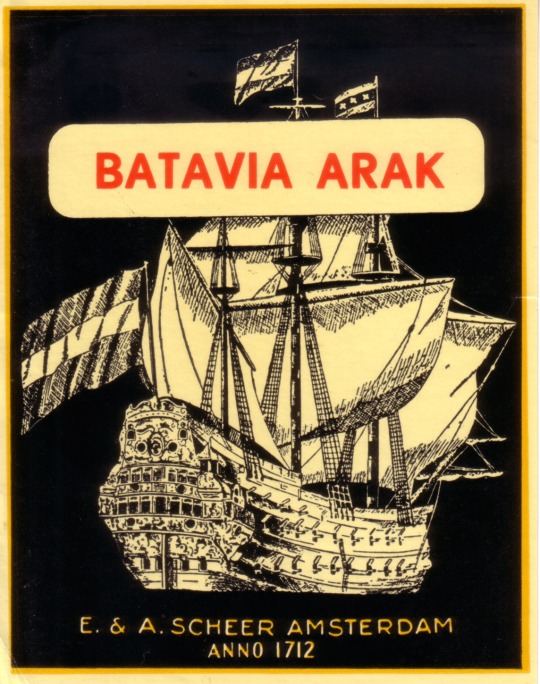
Arrack: The lost spirit of adventure
“Before sugar cane was planted in the Caribbean, before gin laid waste to London, even before the word “alcohol” was first used, people drank arrack.”
“Since the words “alcohol” and “liquor” would not be coined until two millennia after the drink was first recorded, the word “arrack” (along with its different spellings and accents) became a popular term for any alcoholic beverage. With India’s close influence on the Spice Road trade routes that fed the Persian, Mongolian and Ottoman Empires, arrack (both in word and product) travelled and traded alongside the silks and spices of the time. As such the drink and its name became associated with the empires of the east until eventually emerging onto European shores with the first East India merchantman of the 16th century.”
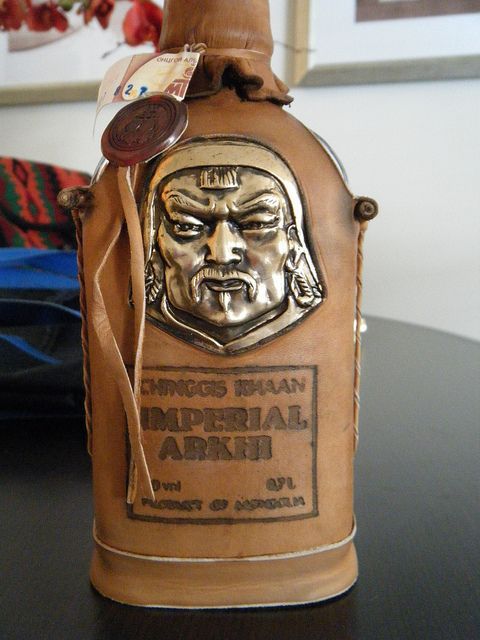
“A more unique style of arrack (aka arkhi, araku, arika or vina) is that of the Mongolians. Distilled from their national drink airag (aka koumiss – a traditional wine made from fermented mares milk) once distilled, the milk yields a mere one-tenth the alcohol of traditional fruit and grain spirits. Additionally since the milk has no vegetable ingredients, it is impossible for the fermentation to produce any methyl alcohol and so a single rough distillation is commonly enough.
With the huge sums of money made by the might of the English and Dutch East India trade companies it was only a matter of time before barrels of arrack arrived back into the home ports of London and Amsterdam. Under the additional influence of the new coffee house culture of the later 17th century, the common servings of ale and mead made way for more spirituous tipples such as genever, brandy and arrack. And the most popular way to enjoy them all – punch.”
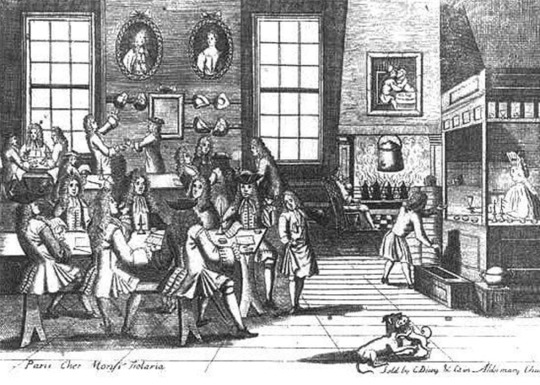
“The etymology of the word “punch” further supports an East Indian origin with the Hindustani word for “five” written as paanstch...In 1644 an East India representative remembered only as Bennin, mentions an early punch named boulepongemade of “arrack, black sugar[molasses enriched sugar], juice of lemon, water, and a little muscadine [sweet wine]“. These same five base elements to which punch is defined (sweet, sour, strong, soft, spice) would ultimately help form the same base to which many of our modern cocktails apply – sugar, citrus, spirit, mixer and bitters. As for sailors, punch and arrack became as synonymous with their profession as wenches and scurvy.”
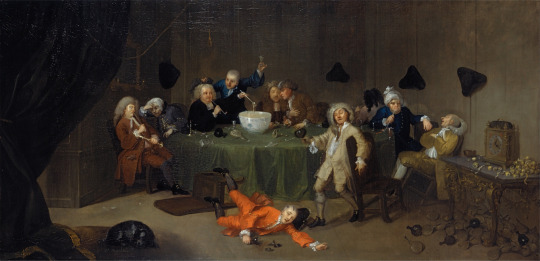
“By the early to mid 1700’s many an English coffee house became rebranded the punch house in line with the emerging popularity of the drink. One of London’s most popular venues was The London Coffee House and Punch House ...the worlds first cocktail book written by Jerry Thomas in 1862 (How to Mix Drinks or the Bon Vivants Companion), contained a large number of arrack recipes such as the aptly named Arrack Punch and popular Ruby Punch (click here for full recipe).
Since its earliest reference in Indo-Aryan Sanskrit at the start of the Iron Age, arrack is now over 3200 years old. Arrack has influenced the creation of the worlds first mixed drink while fueling the colonists and adventurers who helped develop much of the modern world.”
(via Arrack: The lost spirit of adventure | Drinking Cup blog)
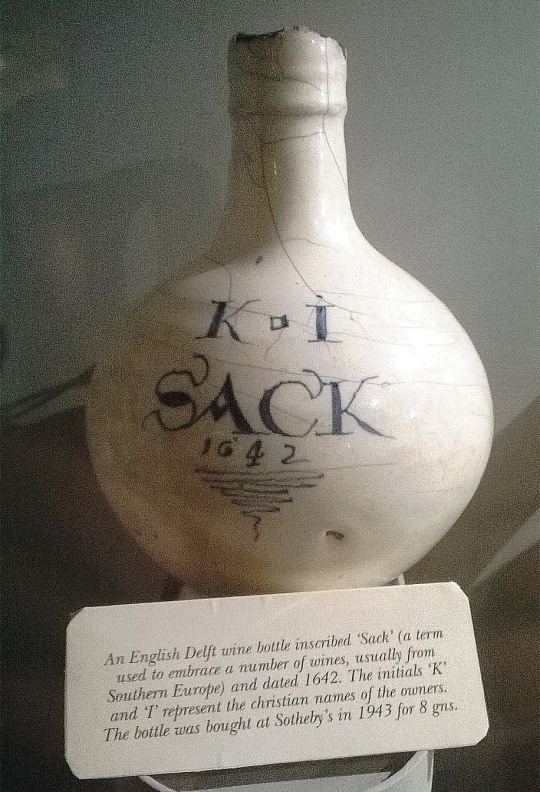
Kumis, the Traditional Drink of Gengis Khan and Attila the Hun
“Starting with kumis. This is a fermented dairy product, originally made from mare’s milk. Therefor a good example of the lifestyle of the ancient residents of the Asian steppes. These people were surrounded by horses since the day they were born, and as a figure of speech they rode them before they could walk. In the bare wide plains these tribes depended fully on their trusted animals. For transportation, fighting, clothing and food and drinks.Mare’s milk contains more sugar than sheep or goat milk, of which it’s cousin kefir is made.”
(via Kumis, the Traditional Drink of Gengis Khan and Attila the Hun | The Lord of the Drinks blog)

Kumiss - A discussion thereof.
“Occasionally, the Mongols distilled the airag to make a clear spirit called Arkhi with their homemade distillery. A bowl of airag is placed in the bottom of the metal barrel shape container, an empty bowl is fitted inside it towards the top of the barrel and a third bowl of cold water is placed at the top. All of this is placed on top of the stove, which is heated by dried animal dung. The airag is heated, evaporates and condenses on the bottom of the cold bowl and drops into the empty bowl. This can produce Arkhi up to 10-20% alc depending on the still.”
(via Kumiss - A discussion thereof. | Jolly Duke Tavern blog)
Arkhi made from kumis kefir in a Mongolian yurt
youtube
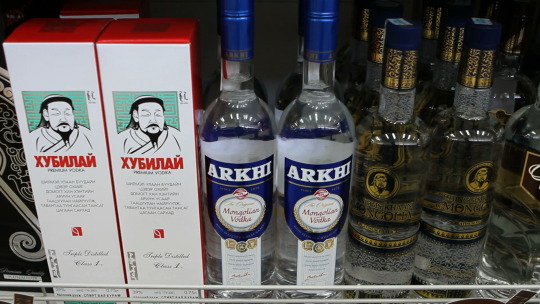
0 notes
Text

Andy was in something of a mizzmog mood when I woke him up so I made him a coffee and left him to it. I wandered up to the breakfast room and got to whirling around the people trying to get to the various pots serving bits of niceness that I didn’t much fancy. Strange that at the beginning of a holiday you can launch yourself into almost anything you can get your hands on but by the end of three weeks all I want is coffee and toast…maybe with jam on it.
I look around the room; it’s very international here. There are people from India, China, Japan; there’s African-Americans, Irish-Americans from New York and Hispanic Americans and there’s me in the corner (the bemused looking Brit with jam on her chin). Having had my fill, I take a coffee and have a cigarette outside the front of the hotel. It’s a strange place, busy and frantic and it smells funny.
Andy gets up and we go to the front of the hotel for the ride we booked yesterday. The man with the van was very helpful but there was no way that Andy was going to get into his minibus. I can’t believe the front desk guy said it would be accessible. He could see Andy in his chair and he must have known what the van looks like. I don’t generally get annoyed at people’s service but…grrr…what a prick!
We hire a taxi ride from a Turkish fellow who happens to be parked up a few feet away from the minibus and we’re whisked away through the streets of LA at warp factor ten. I swear the guy must have had a death wish as we swerved in and out of traffic so quickly that even Andy stopped talking.
Universal Studios is big and it’s hot and it’s very, very busy. We get checked through security and head down a mock English street which reminds us of how much England is in no way like Southern California. There’s the Ford Anglia from Harry Potter and a man dressed as SpongeBob, a life-size Scooby doo and minions. There’s fun land which looks gleeful and sparkly in the sunshine with all its water rides and, and, and, Harry Potter land where Andy gets pissed off with all the cobbles and the Simpson’s land with Krusty burger and Kwiki-Mart and, and, and, can we stop and have a drink now I’m getting a headache.
It’s lovely, a lot of fun and too much for two hicks from Devon. I can see Andy is getting jaded with getting through crowds so we head for one of the shows: Waterworld. As Andy uses a wheelchair we get seated right at the front. The show has a lot of stunt men and women (all rather buff) pretending to have a mock battle. To accompany the performance is pyrotechnics, smoke, a lot of shouting and people swinging from lines and coming down ropes, doing jet-ski stunts whilst bits of the set collapse. All this furore continues to a crescendo when a full-size airplane is thrown over a thirty-foot wall, landing straight in front of us and sending up a huge wave of water. And with that, we were back to liking the place again…and both very wet.
In our soggy clothes we head off to Starbucks and spend more time in the queue there than we did in the show. Jered up by coffee and soakyness we find a second show on special effects where yet again we get to sit right at the front. This time instead of water we get fire. One of the stuntmen, with special clothing and hands and face covered in some special goo, gets set on fire. He staggers around in front of us and gets so close that we can feel the heat coming off him before he drops to the ground. It was decidedly splendid.
We could have hit a few more shows but time was getting on and we were both starting to flag. We got a taxi, this time a less insane one, and go back to the hotel.
For dinner, we went across the road to the Ranch a late night bar and grill that has a mock horse and rider coming out of the front of the building. Inside it’s like everywhere else in LA, ludicrously busy. A girl is on one of those mechanical bull rides and she spins around whilst the crowd whoops and cheers. A couple of guys are going round the tables asking to play their guitars at people; we politely decline and we get our burgers and fries and drink beers whilst being interrupted every thirty seconds by staff asking if we’re okay. I swear they must have thought we were food critics as they just kept coming and at the end of the meal we got offered a free beer and on declining that we were given free shots. It was fun but a bit too much and maybe that’s LA for you. It’s great if you’re young; I can imagine a twenty or thirty-year-old me would love it here but at nearly fifty I feel like I’ve crashed a teenage party. We go up the road to the relative sanity of the Comedy Store and have a final beer in the USA.
It’s all been incredible. I keep thinking back to the three weeks that we’ve been here and it’s as if there’s too much memory luggage for my brain to take in. I can’t say it’s been a holiday as I don’t think we’re going home relaxed and chilled but it has been an adventure. We’ve driven some three and a half thousand miles, seen glaciers and bears in the wild, met hookers and firemen, avoided rock falls and got drunk in strange places with wonderful people, seen bouncing cars, SpongeBob, a man on fire, the rolling Pacific Ocean and a lot of road. There has been the coldness of Canada in the mountains and the chest smashing heat of Oakhurst. It’s all merging in my mind and I’m glad that I’ve kept up this diary. Along the way, we’ve got gnarly with each other and laughed and worried about where the hell we are and how the hell we’re getting to the next place. And we’re at the end, nearly at the end of the road. Just one more drive to the airport in the Nissan (not such a) disappointment.
It’s time to be getting home on a ten-hour flight to the UK and then Devon and rolling hills and home and my cat and proper tea. Home. Onwards!
LA to see a man on fire…and home Andy was in something of a mizzmog mood when I woke him up so I made him a coffee and left him to it.
0 notes
Text
Rum For Cooking and Drinks
Rum is rum, right? Not quite. While rum may be a distilled beverage made from the rum seed, rum ether is rum made by a fermentation process that uses sugar to create alcohol. While rum may have "rum" in its name, it is not necessarily a rum-based drink; it can be any flavorful alcohol created by fermenting sugar and adding yeast culture to help fermentation. In the United States, rum is considered an Irish drink due to an American influx of Irish immigrants during the mid-nineteenth century.
Rum is a very flavorful alcoholic drink made from the rum plant. However, rum ether also has a distinctive smell and taste. A chemical analysis of rum ether research produced by rum distillers has identified 22 key components in varying concentrations; among those 22 are vanillin, sulfites, ferulic acid, flavonoids, toluene, catalytic acid, phenol and other organic compounds. Among these compounds, sulfites have been identified as being responsible for the rum flavor, while the presence of other organic compounds have been attributed to coloring. The most common coloring agents used to create rum ether include zinc (such as the brandy coloring that is often seen in top-quality rum) and tinned compounds.
So how do you make a good rum ether? When making a rum ether, it is important to note that colorless fruits and vegetables will typically produce the best taste and color in a mix. Citrus fruits, such as oranges, lemons and limes, tend to produce the most flavor and color with their high water content; however, they also tend to lose much of their color as they age. Fruit extracts that do not retain much of their initial color include grapefruit and mango, which are largely colorless. Vegetables and grains that have relatively little water content will tend to retain more of their color, so if you are looking for a good colorless fruit or vegetable combination, these would be the ideal fruits and vegetables to use. Other fruits and vegetables to combine well with rum would include cucumbers, peaches, pears and strawberries, as they also hold true to having a high water holding capacity.
To make your own rum flavored drink, it is quite simple to make a batch of your favorite ingredients and mix them up. All it takes is a bit of mixing and a bit of patience to achieve the desired taste. For instance, mixing up a mixture of sugar, rum and lime juice can produce an amazing tropical style drink. There are rum flavored juices that are created with coconut, lime, orange and even vanilla flavors. With rum, you have choices such as rum flavored water, rum flavored syrup, rum infused ice cream and rum punch.
When it comes to using rum in cooking, there are many dishes where you can add the flavor without having to purchase the actual rum itself. One great dish is shrimp gumbo, which can be created simply by melting down some seafood gumbo along with some chicken stock, cream and mayonnaise in a blender. Once you blend all of these ingredients together, you will have a tasty and quite delicious dish that will fool even the most seasoned gourmet chef! You could also create a rum infused gingerbread recipe, which would be delicious after the holidays.
Many rum flavor recipes are available online as well as in many cookbooks and pastry books. By experimenting with different combinations of fruits, spices and fruits and adding the appropriate amount of sweeteners, you can create recipes that have a high degree of complexity. If you have never made rum before, however, it may be best to start with lighter rum flavors in order to allow your palate to get used to the different flavors of rum. As you become more experienced, you can then move on to using stronger rum varieties.
LIST OF FIGURES
The research team projects that the Rum Ether market size will grow from XXX in 2020 to XXX by 2027, at an estimated CAGR of XX. The base year considered for the study is 2020, and the market size is projected from 2020 to 2027.
The prime objective of this report is to help the user understand the market in terms of its definition, segmentation, market potential, influential trends, and the challenges that the market is facing with 10 major regions and 50 major countries. Deep researches and analysis were done during the preparation of the report. The readers will find this report very helpful in understanding the market in depth. The data and the information regarding the market are taken from reliable sources such as websites, annual reports of the companies, journals, and others and were checked and validated by the industry experts. The facts and data are represented in the report using diagrams, graphs, pie charts, and other pictorial representations. This enhances the visual representation and also helps in understanding the facts much better.
By Market Players:
Advanced Biotech
Firmenich
Bell Flavors&Fragrances
Augustus Oils
VENTÓS
Aurochemicals
TREATT
CJ Latta&Associates
BERJE
Fleurchem
Reincke&Fichtner
Lermond
Ungerer&Company
By Type
Food Grade
Modulation Level
By Application
Liqueur
Soft Drink
Other
By Regions/Countries:
North America
United States
Canada
Mexico
East Asia
China
Japan
South Korea
Europe
Germany
United Kingdom
France
Italy
Russia
Spain
Netherlands
Switzerland
Poland
South Asia
India
Pakistan
Bangladesh
Southeast Asia
Indonesia
Thailand
Singapore
Malaysia
Philippines
Vietnam
Myanmar
Middle East
Turkey
Saudi Arabia
Iran
United Arab Emirates
Israel
Iraq
Qatar
Kuwait
Oman
Africa
Nigeria
South Africa
Egypt
Algeria
Morocoo
Oceania
Australia
New Zealand
South America
Brazil
Argentina
Colombia
Chile
Venezuela
Peru
Puerto Rico
Ecuador
Rest of the World
Kazakhstan
Points Covered in The Report
The points that are discussed within the report are the major market players that are involved in the market such as market players, raw material suppliers, equipment suppliers, end users, traders, distributors and etc.
The complete profile of the companies is mentioned. And the capacity, production, price, revenue, cost, gross, gross margin, sales volume, sales revenue, consumption, growth rate, import, export, supply, future strategies, and the technological developments that they are making are also included within the report. This report analyzed 12 years data history and forecast.
The growth factors of the market is discussed in detail wherein the different end users of the market are explained in detail.
Data and information by market player, by region, by type, by application and etc, and custom research can be added according to specific requirements.
The report contains the SWOT analysis of the market. Finally, the report contains the conclusion part where the opinions of the industrial experts are included.
Key Reasons to Purchase
To gain insightful analyses of the market and have comprehensive understanding of the global market and its commercial landscape.
Assess the production processes, major issues, and solutions to mitigate the development risk.
To understand the most affecting driving and restraining forces in the market and its impact in the global market.
Learn about the market strategies that are being adopted by leading respective organizations.
To understand the future outlook and prospects for the market.
Besides the standard structure reports, we also provide custom research according to specific requirements.
The report focuses on Global, Top 10 Regions and Top 50 Countries Market Size of Rum Ether 2016-2021, and development forecast 2022-2027 including industries, major players/suppliers worldwide and market share by regions, with company and product introduction, position in the market including their market status and development trend by types and applications which will provide its price and profit status, and marketing status & market growth drivers and challenges, with base year as 2020.
Key Indicators Analysed
Market Players & Competitor Analysis: The report covers the key players of the industry including Company Profile, Product Specifications, Production Capacity/Sales, Revenue, Price and Gross Margin 2016-2021 & Sales by Product Types.
Global and Regional Market Analysis: The report includes Global & Regional market status and outlook 2022-2027. Further the report provides break down details about each region & countries covered in the report. Identifying its production, consumption, import & export, sales volume & revenue forecast.
Market Analysis by Product Type: The report covers majority Product Types in the Rum Ether Industry, including its product specifcations by each key player, volume, sales by Volume and Value (M USD).
Markat Analysis by Application Type: Based on the Rum Ether Industry and its applications, the market is further sub-segmented into several major Application of its industry. It provides you with the market size, CAGR & forecast by each industry applications.
Market Trends: Market key trends which include Increased Competition and Continuous Innovations.
Opportunities and Drivers: Identifying the Growing Demands and New Technology
Porters Five Force Analysis: The report will provide with the state of competition in industry depending on five basic forces: threat of new entrants, bargaining power of suppliers, bargaining power of buyers, threat of substitute products or services, and existing industry rivalry.
COVID-19 Impact
Report covers Impact of Coronavirus COVID-19: Since the COVID-19 virus outbreak in December 2019, the disease has spread to almost every country around the globe with the World Health Organization declaring it a public health emergency. The global impacts of the coronavirus disease 2019 (COVID-19) are already starting to be felt, and will significantly affect the Rum Ether market in 2021. The outbreak of COVID-19 has brought effects on many aspects, like flight cancellations; travel bans and quarantines; restaurants closed; all indoor/outdoor events restricted; over forty countries state of emergency declared; massive slowing of the supply chain; stock market volatility; falling business confidence, growing panic among the population, and uncertainty about future.
Global Rum Ether Market Research Report 2021 Professional Edition Market report offers great insights of the market and consumer data and their interpretation through various figures and graphs. Report has embedded global market and regional market deep analysis through various research methodologies. The report also offers great competitor analysis of the industries and highlights the key aspect of their business like success stories, market development and growth rate.
Global Textured Pea Protein Market Research Report 2021 Professional Edition Market
Global Ouzo Market Research Report 2021 Professional Edition Market
Global Canned Luncheon Meat Market Research Report 2021 Professional Edition Market
Contact us: https://www.reportmines.com/contact-us.php
0 notes